#which are always surface level criticisms of tropes in media
Explore tagged Tumblr posts
Text
I see a post about how JK Rowling's goblins are antisemitic. I click on the person's blog. Their blog is filled with Holocaust inversion, MENA Jewish genocide denial, Hamas support, political "takes" from Twitter bitches with the red triangle in their usernames. I click out and block.
#its a little morbidly funny how consistent this is#like i can fairly accurately predict if someone is a raging antisemite based on the things they do choose to reblog about antisemitism s#which are always surface level criticisms of tropes in media#which while true sure are kind of an obvious distraction when there is a massive title wave of ~leftists~ reframing supporting antisemitic#terrorists as progressive praxis#🤷♀️🤷♀️#if youve posted about jk Rowling's goblins don't feel bad thwy are antisemitic#its just very obvious and stupid when someone is like HEY LOOK OVER HERE!! LOOK AT THAT!!! THAT KIDS STORY HAS BAD GUYS WITH BIG NOSES!!#DON'T LOOK BEHIND ME AT THE A CURSE UPON THE JEWS FLAG LOOK AT THE KIDS BOOK!!!#gingerswagfreckles#antisemitism#leftist antisemitism#jumblr
356 notes
·
View notes
Text
friendly rivalry deep dive part 1
Korean GL Friendly Rivalry is my latest hyperfixation, if you can’t tell. It’s my favorite kind of love story—a little bit twisted, but sweet and sincere deep down—and it’s a treasure trove of tropes that scratch a primordial itch in my brain. It’s also ~*dense*~ for a GL series, and practically begging for deeper analysis. There is so much going on plot-wise, character-wise, and otherwise that it’s almost impossible to catch everything the first time you watch it. Probably a little too much going on tbh but I’m not complaining! GL fans don’t often get media this juicy to sink our teeth into. So instead of feeding my obsession by watching every FMV I can find on Youtube (been there done that), I’ve decided to rewatch the series at a slower pace, picking it apart piece by piece.
Some criticism might sneak into these deep dive posts, but my goal isn’t just to write a longer more in-depth review. I already know that I love this show, and I already know it’s got problems. Instead this will be a space for thinking out loud as I try to understand the story and characters on a deeper level, because I Have Thoughts and I Must Scream. Idk how many installments there will end up being, or how much content I’ll cover per post, but I think, for simplicity’s sake, I’ll try to proceed in episode order without jumping around too much. Oh but do watch out for spoilers—I’m writing for others like me who have watched the whole series at least once.

So...where better to begin than with the first scene of Episode 1? This opening scene is doing a lot. On the surface, it’s establishing Seul-gi as our narrator. This is her story, in her own words. We aren’t getting an “objective” account.
It’s also establishing style. From the first few seconds we know not to expect straight realism. There is no logical reason a child on a school trip would happen to have dog treats in her, um, royal handbag. This is the heightened realm of dreams and memories. She has the dog treats to illustrate an emotional truth. This poor girl is so desperate to be noticed that her efforts to stand out only isolate her more from everyone. (The princess dress is such a believable detail, too—you either know a stubborn kid who insists on embarrassing themselves like this, or you were that weird kid.) I’m struggling to think of a more perfect way to express that overwhelming feeling of invisibility than a dog turning up its nose at the treats in your hand.


This scene introduces some symbols that will pop up throughout the series. There’s another important dog later, and lots of water, and the princess dress comes back. I’m not sure what any of these are doing yet, but they seem intentional, not random. There’s some fun with the visual language too. We’re shown a series of snapshots in which Baby Suel-gi is always in the background or a bit out of frame. But some mysterious hand has helpfully outlined her and drawn some cute little pictures on the photos. Is she not only narrating her story, but illustrating it for us?
The thing about this scene is, while I love it and think it’s brilliant, it also doesn’t really make any sense. How hard could it be to locate a lost child in a princess dress if the parents knew which beach the school was visiting? Couldn’t they contact the nearest police station, or whatever institution deals with such cases? Or just contact every orphanage in the area? Maybe something got lost in translation, or maybe it just needed a little extra lampshading. Either way, it’s a bold move to hang the whole plot on a moment of what feels like dream logic.

On a poetic level, though, it’s very satisfying. The cosmic irony of being separated from everyone you’ve ever known, just because you wanted a little attention, is so deliciously bleak—and on a character level, it tells us exactly what we need to know about Seul-gi. This is a girl who has been fucked up by The Gaze. (Not The Gays yet but we’re getting there.) She’s either been ignored and forgotten, or she’s stood out in ways that have sharpened her isolation. The only thing she hates more than being noticed is not being noticed at all.
This is literally just the first minute of the episode, but already this scene is gesturing at a larger character arc. How will Seul-gi react to attention from others from now on? Will she be able to overcome the trauma of abandonment? Will she ever find someone—say, a popular girl at school who skateboards, perhaps—who can see her for who she really is?
Oh no. I just wrote six paragraphs about the first minute of the first episode. I am so doomed.
#girls love#gl drama#gl series#korean gl#friendly rivalry#jaeyi x seulgi#sapphic#kdrama#korean drama#deep dive
41 notes
·
View notes
Text
There's a lot of discourse going on over on TikTok right now regarding Booktok. And as an avid reader, Booktok watcher, and someone who has a deep love for analyzing the media I enjoy, I'd feel remis if I didn't get my thoughts out there.
I know these particular posts never got much engagement when I posted on my old account, but if I could please just have a bit of your time. This is all apart of a larger subject of which I'm extremely passionate on.
Four days ago Booktoker @bookishwithb aka, Celine, posted a video. In that video she talked about the rise of anti-intellectualism, specifically on booktok. She addresses the way books are "marketed" or presented on booktok, and also how that has an impact on the publishing industry.
Her main talking point was how a lot of books are being recommended based on what tropes are in them. More specifically, reduced based on those tropes. Her example being the Poppy War, by R.F Kuang.
She talked about how she's seen it marketed as a book with "a strong female main character." And how infuriating that was to her. She went on to explain how there was so much more to the book and how it was about war, and trauma, and how dark and deep and impactful it is. I highly recommend this video to anyone interested. Because while controversial it says a lot about the "tropeification" of media (which will probably be a post by me sometime in the future).
And as is the ways of the internet, this sparked something huge.
So many different creators responded to her video. Some agreeing, most disagreeing. There's been outrage, and healthy debate. But mainly (and most importantly) conversation. Everyone throwing their two cents in, people defending the right to read what you want how you want.
And since the original video went up, this conversation has taken on a life of it's own. It's now become about reading for fun Vs. reading for analysis.
Many argue that it doesn't matter why people read, or how. Just that they are. Others argue it's a sign of a bigger issue that readers no longer engage in the story's their reading.
I have my own opinions. I agree with both sides on certain things, and am overall enjoying the discussions. But, as always, I have things to say.
There are some books that, while entertaining and a fun read, have no substance per say. No analytical value. I think a lot of those three-hundred page medium spice romance books you find on a table at Barnes and Noble fall under this category.
Now, I really love reading those books. Their quick easy reads that keep me entertained. But, they really cannot be analyzed past surface level. Very much not a time to try and think critically.
Those are the books I read for escapism. When I just want to decompress and turn off my brain. Or make a long car ride pass by quickly. And that's okay. Yes? Because it's still reading. I am still gaining something from it. Physiological benefits, it's encouraging and strengthening my empathy. I am still (in some cases) increasing my Lexile, and keeping my brain working. Which is amazing.
Other times I read things with very high analytical value. Such as High Fantasy Novels with social commentary reflecting our world. Or Dystopia packed full with metaphor, allegory, and symbolism. Or even my most recent read for college: Brown Girl In The Ring, by Nalo Hopkinson. An amazing book commenting on the suburban sprawl, and urban decay. Sprinkled with magical realism regarding Afro-Caribbean culture, and even mentions of Romani practices such as Tarot.
These are books I read knowing I need to turn on the part of my brain that's very analytical. That enjoys breaking things down in that way. Storylines I have to engage with on an additional level, otherwise I miss the entire point of this story. It's not only important, but necessary.
So, yes. Reading is reading, now matter what. And any reading is better than no reading. And we should foster that mindset, especially amongst younger generations. But, that doesn't mean you should never engage critically with a book or show or movie you're consuming. Because some media requires that for a base level understanding. And saying that doesn't make me elitist. Or pretentious or judgmental or a snob. Because it's really just true.
I've seen a lot of creators bring up the literacy crisis in youth, specifically in my country (America). How many kids can't read at a level they should be in elementary schools. Even in Highschool. And that we really should all just be content there's an entire community at least reading at all. That we should encourage any and all reading.
And to that I say... yes, but no.
Because here's the thing. There is in the most literal sense, a literacy crisis. The kid's can't read. And it is absolutely devastating. As someone who grew up devouring books every week, reading three grades above my own, it's soul crushing. So I do think reading should be more pushed and encouraged. In school, in the home, everywhere. As much as possible and appropriate for children. Any and all.
But, there's also another literacy crisis. A Media literacy crisis.
Media literacy, the ability to critically analyze and engage with media, is at an all time low. According to a survey done by Media Literacy Now and, the Reboot Foundation, 42% of respondents were taught how to analyze media. Let that sink in. 42%. That's less than half the people who participated in the survey.
(More statistics generated by AI with the following prompt: Give me reliable statistics regarding media literacy in terms of books/reading:
A Survey done by the National Endowment for the Humanities states 65% of adults have low literary skills when it comes to reading comprehension, critical thinking, and expression.
Pew research conducted a survey with resulted in 57% America adults having read at least one book in the last year. With 26% American adults not having read any form of book in the past year. Including audio books.
The American Library Association has said that the average American only reads four books per year. And more developed countries only have average citizens at ten books a year.
An Survey done by Reading Partners has said that 1 and 4 children read at a below basic level by the end of 4th grade.)
And we see this sentiment echoes all over the internet. Constantly videos are made with people talking about how they were never taught Media literacy, and their should be a class all about just that (Which... I have thoughts on. Again, another post).
Even though you can (rightly) argue that this skill was taught. In English class. That's not the point. The point is that people cannot only not read, but most young adults and fully grown adults cannot read critically. Cannot, will not, and aren't.
And in some cases it's because they don't and still don't have the resources. But these statistics aren't just minorities, people in poverty. These surveys and statistics cover people from every walk of life. Poor, Rich, White, Black, Asian, Hispanic. Queer, Straight, Trans, Cis. All ethnicities, wealth brackets, identities. Every demographic. It's indictive of a larger issue.
So we should encourage reading for fun. Reading to read. Reading for escapism. Reading of every kind. But, to claim that there isn't an issue? To trample creators addressing these issues with insults? To claim it's them being pretentious, snobby, elitest, Privileged etc.? That's feeding the issue.
Recently my friend recommended me a video essay, which I unfortunately can't find (Will edit the title when I can).
But in that video, my friend told me that the creator says something... so insightful. She defines stupid as this: Not a lack of knowledge, but the unwillingness to accept new knowledge.
Which is just... such a perfect way to look at it.
You aren't "stupid" for not knowing how to think critically. For not having learned to analyze media, and for not having the resources to do so. But if you have the resources, have the ability to learn how, and you don't/refuse? That makes you stupid.
And by burying your head in the sand and claiming that there is no issue, by hiding behind pseudo offense and that claims of judgement, you're being stupid.
Don't be outraged that the creator of the video that started this all. Don't feel "called out" or judged. Don't put words in her mouth. She wasn't saying people cannot read for enjoyment. She was simply pointing out a larger issue.
--------------------------------------------
To end this very long and tedious post, I'd like to provide a couple of videos in order to help improve Media Literacy! Just some videos I've watched that I found helpful (Also if you just go on youtube and search up "how to analyze..." you'll find so much more)
Crash Course Media Literacy: A playlist series that breaks down media literacy and the history of media as a whole.
How to analyze a Book- 101: This video gives techniques on how to better understand what you're reading, and how to find the main themes and organize them. It gives tips and processes.
How to Read (and Understand) Hard Books: This video breaks down the three types of reading and even gives book recommendations that touch on that.
A beginner's guide to Critical Literary Analysis: This video is made by fellow tumblr user @bluemooniegif (One of us ✊One of us✊). A very good video for beginners. They literally opens the video telling the viewer you don't need any prior knowledge. They also has another video on her channel, which is just the next step up from this one! It's super great, and perfect if you're younger or have less of an understanding on any of this.
Diving into and developing media literacy skills takes effort. It's not a skill you can gain over night, and requires time. But, if you're willing to take that time, a whole new world opens up to you. And you begin to look at everything through a whole new light.
#media literacy#anti intellectualism#booktok#booklr#books and reading#i rambled a bit#sorry yall...#I've got media literacy on the brain#as always lol#I still have more to say.#more posts like this#soon#jdj-mlb
22 notes
·
View notes
Note
Twitter (or “X”, I guess) is currently losing its mind over a media analysis video that implies King Kong might have some racially charged (or even racist) themes. Thoughts?
I actually talked about this recently here: https://tyrantisterror.tumblr.com/post/730214779314176000/kaiju-twitter-is-currently-in-a-tizzy-because
But I also think King Kong (1933) has a somewhat undeserved sterling reputation in general. Even critics who have otherwise been quick to be hypercritical and dismissive of monster movies talk about King Kong as if it's a "perfect" movie, because historically King Kong has always been considered a classic. And, like, historically speaking, yes, King Kong will always be an important and groundbreaking film. It's a landmark moment in special effects.
But if you take the special effects out of it... you're not really left with much to rave about. The acting in King Kong ranges from passable to outright bad (and racist when you consider the islanders and Charlie the inexplicable Chinese Stereotype cook who exists for... comic relief? I guess?), the characters themselves are thin, the dialogue can be very good but also outright atrocious, and the camerawork (again, outside of special effects) is nothing to rave about. King Kong has a reputation for perfection that's solely hinged on cool special effects and a shitload of nostalgia. It does not have the depth to its storytelling of, say, Godzilla (1954), which had to claw and fight over decades to be reappraised by critics for its many virtues. All King Kong has is groundbreaking special effects.
And those special effects are really good, don't get me wrong. You feel for that monkey before the movie ends, and the wonder and terror of Skull Island's ecosystem of monsters is rightfully iconic. But if you dig past that - and you have to if you want to analyze the movie, because most of it is surface level stuff - you're not left with much to analyze, and what there is to analyze are a bunch of racist tropes that were old and timeworn by the time King Kong was made, and much more so now. Evil black savages who want to sacrifice a white woman because of her enchanting Aryan beauty, a giant ape who's horny for said white woman because of said enchanting Aryan beauty, heroic white men risking everything as they plunder an evil, backwards island of degenerate relics from the past that were best left forgotten, Charlie the Chinese Cook who is exactly as grating a racial stereotype of Chinese people as you'd expect from the 1930's - yeah, all of these tropes have racist roots, and whether or not the racism was intended by the creators doesn't really matter, because they certainly did nothing to try and mitigate it or divorce the tropes from those racist roots. It's a racist movie, an undeniably racist movie, which isn't something that should surprise people because it's from the 19fucking30's.
And that doesn't mean we have to condemn King Kong, and that watching it makes you a problematic Nazi MAGA chud, or that we're not allowed to praise what's good about it (i.e. the special effects). It just means that, maybe, after 90 years of completely untempered praise from all corners of the film world, maybe it's time to admit that King Kong, while still a classic, is not a perfect movie. That it has some flaws. And maybe we can start by admitting the really obvious flaw of it being a movie from the 1930's that reflects the 1930's attitudes about race which were, you know, not great, and then from there we could maybe talk about how it reflects 1930's attitudes about gender (also not great), and then to how the acting in it is mostly bad, and then to how the scriptwriting is... let's say uneven, and then maybe admit that really we just like the monster bits and the rest is kind of forgettable at best, and that Godzilla is a far superior movie in all respects.
But I think what's likely to happen is people will viciously defend the movie without thinking about it critically for a moment, because nuance and honest self reflection is for chumps.
79 notes
·
View notes
Text
More thoughts:
I can’t really figure out the PG-13 cut, unless as a cheap way to sell out their vision to market the movie to more audiences. Isn’t this guy’s whole schtick cool action sequences and gratuitous violence? No damn wonder it got poor reviews.
Space Nazis. Why are the bad guys always Nazis? It’s become this easy peasy shorthand for morally black imperialists at this point, and all it does is produce cardboard cutout bad guys who require absolutely no thought and provoke no critical thinking or correlation with any real world powers (besides the historical Nazi Germany, in contrast to any nazis today). Which is probably the point. Media using this trope is not usually in the business of encouraging critical thinking and especially not criticising any policies of any countries beside Nazi Germany. Because we’ve decided Nazi Germany was irredeemably evil and we don’t need to think why or how it became that way. Of course the Nazi reign was evil, but reducing the imperialists to just these morally black characters also denies any possibility of recognising similarities to ourselves or our own policies.
At this point, I’d metaphorically kill for one of these big movies to have a cast of heroes without a single white guy, and model their bad guys after the English or French colonial empires or American troops, and make them if not empathetic, then at least understandable, recognisable. But I guess that wouldn’t sell, huh?
Ooh, and Rome and the assassination of Caesar as well. And I guess it has to be said that these Nazis apparently are actual Nazis, including the whole racial purity thing, not only borrowed iconography.
Oddly enough, this is why I kind of like the weird tooth fetish the priests have going on. I mean, it’s weird and gross and horrible, but at least it hints at a religion and culture that is something unique. It’s probably just surface level gimmick, but at least it’s something.
Also Jimmy the nature spirit and the big imprisoned engine guy on the ship. They seem more like upcoming plot points!
Weird, that they have starships, but are still farming like medieval peasants instead of having some old, junky farming bots. Very picturesque. But stereotypical, much? Oh well, I guess the depth of the worldbuilding is about the same level as the horses in funny headdresses. I do love the little birds though.
Characters ought to stay dead when you kill them. Imo it would have been more poignant if the rebels had killed the admiral, and it would have mattered none at all because both the village and the Imperium were still there. So what if they lost one officer? They’d just send a bigger warship next time. You can’t kill empires by killing a couple of its soldiers, because ultimately soldiers are expendable to empires. And it’s a weird plot hole that Kora doesn’t realise this (“a defence won’t be necessary”—uh, what?). Oh well. I guess the Imperium will bomb the rebel moon from the orbit the next time.
Don’t you just hate it when characters are described as tactical geniuses and then that characterisation is dropped halfway through in favour of a “dramatic” moment? Why don’t movies with military action hire consultants? Or at least listen to them if they do.
Plasma swords and a tilting hangar? I feel like I’ve seen this one before.
Action was mostly pretty good. A few meh moments when melodrama intervened in the middle of the action sequences, but frankly many action movies are even worse. Plot? A bit of melodrama to tie the action sequences together, as one would expect. Worldbuilding? A mishmash of things I’ve seen before, which I actually quite enjoy (except for the space Nazis thing, which is getting old). Acting? Pretty good for the most part, actually. The main characters were carrying this this whole thing.
3/5, if I’m being generous. Fun action romp, but really don’t go in expecting much plot.
Watching the Rebel Moon (director’s cut). Apparently they also made a PG-13 cut as well, lmao. What, did they also make a PG-13 cut of 300 and Sucker Punch?
3 notes
·
View notes
Text
I hate how so many people just... lack any kind of critical media literacy across so many different genres and how just about every genre and common tropes, issues, etc. within them just get boiled down to "Oh this is bad because ableism/racism/homophobia" even though the tropes largely have nothing to do with that. It's like they have such a surface-level understanding of something and then proceeds to read into said surface-level understanding in a contest to see who can come up with the most disingenuous, bad faith, uncharitable and just all-around god an awful interpretation of it.
"Characters having prosthetics as an allegory for losing their humanity is ablest because it is saying that if you got into an accident you are a monster." No, you absolute peanut. Robotic parts specifically are an allegory for the loss of humanity in characters that just get rid of their human body because they were being reckless, stupid, thought that it was not perfect enough, too weak, etc. Oftentimes, this is juxtaposed with a character that is a robot but is more human than the cyborg or person that just gets another piece of them replaced with a machine.
Ironwood getting increasingly mechanical parts as he is making increasingly inhumane choices in regards to himself and others is not saying he's a monster because he had an oops boo boo and had to replace his arm. ESPECIALLY when his character is juxtaposed by a character who has a robotic arm (Yang) and a character who is a created robot (Penny). The reason why Yang said that her robotic arm (and even taking pride in it at that) is "just extra" because it is just an extra asset to who she is as a person, but not her whole person. In terms of Penny, she is entirely made of machines but has what amounts to a human heart and compassion because she makes a choice to be kind to people. The allegory here (that y'all failed to understand) is that it is not whether or not someone has prosthetic or robotic parts that determine their humanity, but rather their choices and how they treat others.
It is often also the same in stories where it has characters who have robotic parts such as Alita Battle Angel or anything that genuinely comes from cyberpunk dystopia. Alita (Who is completely robot mind you) is often more kind, compassionate, etc. than characters who are fully human. Hugo and his crew regularly steal parts from cyborgs who've done nothing to him and this is juxtaposed by characters like Grewishka and Zipan who are mechanical and monstrous but not because of their parts but because of their choices. Which is a strong contrast to Alita who is fully kindhearted and has a strong sense of justice and doing what is right regardless of whether there is a price tag on it.
In more dystopian stories wherein no short words, the corrupt government controls technology and spies on its people using it, it can be a question of how much of your humanity (in this instance, privacy and agency over oneself) you're willing to sacrifice for comfort or just because you had to. But of course, rather than looking at these stories as a potential warning that we should make laws that would prevent the government from using technology against its people under the guise of safety, convenience, etc. Or even having people question wtf do they do should the government get so corrupt that it can just hijack someone's arm or even just stop someone's pacemaker because lol why not.
Yeah I get it, it's uncomfortable but unfortunately, the people who need it the most are going to be the people most at risk to a corrupt government which is like... kinda the point.
But anyways moving on
The same can go for when stories use animals as a means of telling stories revolving around discrimination. But ofc people can only see it as a surface-level "racism" and then do their damnest to force characters into being black/poc or white (and for some reason, only those two races) while failing to realize that the reason it was done is that discrimination has more than one axis. I swear this logic is what has convinced me all the talk of intersectionality in activism is just a joke they say to get other people to just shut up and let them speak over them and ignore problems/issues they don't want to focus on. It's like the only thing they can understand is racism and even that racism is only if it is hatred and black people vs white people. And somehow even that is on its most basic level.
The reason stories like Zootopia and Beastars work when it comes to discrimination because it doesn't solely focus on the narrative of race and allows it to explore the implicit and explicit biases of every character that doesn't exclusively revolve around racism. It allows characters to be on the axis of sexism, racism, class, etc. and explore various -isms that are not always "negative" in the sense that it is just hatred, racial slurs, etc. and that it can be the "positive" racism like saying "you're one of the good ones" or that "they're a token to xyz for not being as bad as everyone else."
It allows characters to fall on multiple axes without people arguing whether they have it "too good to complain" because of just one axis of discrimination that they give more weight to than others for some arbitrary reason.
Even when it comes to things like nudity being a symbol of being true to oneself or purity (such as Sailor Moon or Kill La Kill) people manage to, unironically boil it down to just the writers feeling horny and therefore ignore any other kind of lore, storytelling, etc. that revolves around it. They took one thing, scrubbed, bleached, and then nuked it of any kind of context/meta just to say lol writers horny this bad it literally means nothing else even though there are whole ass plot lines revolving around it. Like do you just pick and choose what kind of plot or storytelling is Valid (TM)?
And this extends to things beyond that and I just don't understand how people can lack such media literacy when you can literally go and read anything you want online. Is it because of people being willfully ignorant? Just lacking media literacy for some reason? Only consuming and understanding media that has to have every meaning shoved down their throat like the tentacle down an anime girl's throat in a hentai??? Like there are so many questions as to how people can come up with so many dumbass takes.
#rainbow things#as you can tell i am like mad#like mad mad#ive seen one to many bad media takes today and yall i cant#i cant fucking do this i can't handle this shit how are some of yall this DUMB#its like you have to intentionally scrub and remove it of any context to come up with some of these takes#like all of it and put it in some vaccum and say#yup the writers did this cause they were misogynistic/horny/racist/ableist#and im just like bruuuuuhhhh#context matters#context clues matter#like holy fuck how did some of you bypass 5th grade media literacy with these god awful takes#or are you just willfully dumb for social media???#like do you NEED to be spoonfed EVERY FUCKING THING??#do they have to shove it THAT far down your god damn throat???#insert rainbow and eldritch screaming cause holy fuck#like i feel like that one woman whose power ring melted and she screeched like a pterodactyle#thats me thats my fucking mood rn
459 notes
·
View notes
Text
Calling bullshit on the opinion that Kishimoto doesn't know how to write romance.
The reason why this entire shipping business on Naruto has been going on for over a decade and still going strong, making fans go absolutely mindless, about a story which is not even about romance, about things that are so effective and impactful that the fans feel completely consumed with it, to the extent where they have almost completely defined their life and philosophies on its basis, is because Kishimoto can write a good fucking romance. And that's what he did. That's the reason why ships are fighting with each other, because it's not just about Naruto the manga or Naruto the series, it's about how they imagine their own romance, it's a deep, profound feeling. That's why they have strong motivations and convictions that drive their insight into the story. That's why there is so much polarity in Naruto fandom. They are ready to jump to protect their ship at a moment's notice because that's how much it means to them.
Are you telling me that it just happened on its own? Just happy coincidences and random factors?
No.
A lot, a lot of thought goes behind closed doors of the studios. I know this because I work in the business. The reason why I was so astounded with Naruto's story because it was actually a brave story. A brave concept. In a shonen. Because I am ready to bet a million dollars I don't have on the fact that Kishimoto knew what he was doing. Anyone who enjoys poetry, or literature, or drama can, if not approve, appreciate Naruto and Sasuke's story. Because it's that deep. Because it's that impactful. Because it's that dark. Because it's that tragic. Because it's that tender. Because it's that painful.
Because it's so...
(Applause.)
Romantic.
These are all the ingredients of a well written romance. This is the reason why I don't care about other ships because I know that SNS is not random or a projection. It's mindfully and carefully and even tenderly written and developed.
Kishimoto's projection? Oh sure. It stands to reason that someone from his real life affected and inspired his favourite character through and through. He did say that he based some characters on certain people from his own life. And he did base Naruto on his own self, if partly. And the reason why I am able to surmise that he could have had a real crush on someone like Sasuke in real life, is because how clearly and insightfully written and contrasted the two characters are. So nuanced. They are like poetry, that's why I am so dazzled with them. Their story is so beautifully shaped by their characters and growth that it creates a clear impression of who they really are in the story. Soulmates. That's the whole crux of the story. They are written out to be this literally 'once in several lifetimes' pairing that finally broke the bonds of hate with bonds of love and changed the entire world and as a result, grew themselves. This is reflected in themselves what with Sasuke being propelled with hate and Naruto with love and coming together finally in a world that they made happen, for each other. And all of their parts and counterparts with which they think and move and function are so well in sync with each other that they lock together perfectly, like two pieces in a two piece puzzle box.
To say that this intricately and intelligently and tenderly written story is just like, an accident, my lord no!
No. The content that is finally syndicated on screens all over the world, especially with the type of response Naruto has enjoyed, and believe me when I say this, everything goes through many levels of scrutiny during production; to the extent of why would this camera angle work better than all the other angles, here's a flowchart and analysis of all of them and let's spend three days on deciding it while the producers are going crazy frustrated with fanatic creatives. This is a very common thing to happen in most serious studios.
Naruto stood out at the time it came out and reached a much larger audience for several reasons. But one of them was that it got the right exposure and was shown to critics outside of Japan, who could appreciate and admire it's cinematic beauty and this reached a different subset of audience. This extra effort is not consistent but it shines at so many places, because it's just good storytelling technically and aesthetically. And the reason why Naruto and Sasuke stand smack dab in the middle of that storytelling, is because Kishimoto told their story with so much feeling, it literally shows. The nuance is just crazy. Note that I am saying nuance and not subtext, even though it's there in heaps. But I want to make a distinction clearly. Like I can write pages and pages over it. Anyway, their story stands out because the nuances are so well defined and mindfully drawn by Kishi, that one can't help but wonder if Kishi actually experienced them. And they are just small things but still get a lot of exposure in the manga and anime. And because they are so small but clearly noticeable, it makes us stop in our tracks and think. And the thing is Kishimoto could have easily done without them and it would have made everything still seem undisturbed but he chose Not to. That kind of decision is a direct result of deep understanding, feeling and thinking in terms of forming a certain visual approach and meaning. The visual language Kishi has used to show their chemistry, their bond, their need for each other, is so tangible, like you could cut it with a knife, that it makes one feel something is right below the surface, simmering and about to explode, but you can't put your finger on what it exactly is. Until you start to think. And it takes some time.
You think that kind of writing is random? Are you out of your mind?
No, Kishi is a maniac. He pulled something that was not easy at all. He is a genius. He is also sadistic because he knows he didn't give us a resolution. Resolution is cathartic to viewers and the reason that nobody got any with Naruto and still not getting any from Boruto is making everyone go crazy. Fifteen years is a long time man. And I can bet my other non existent one million dollars on it. He owns a lot of rights over Naruto franchise, I don't think he can be cowed down to such an extent even by the studio. Kishi fought studios for a few significant scenes of Naruto and Sasuke, he is not unfeeling about them.
Maybe I am being a mere deductionist but more often than not, deduction is right. It's a valid form of acquiring knowledge. Sherlock is right more times than he is not.
Anyway, my point is, Kishi can write romance. Kishi can write very good romance. He could have chosen to remove some tropes and make Naruto and Sasuke either just brotherly or friendly. But he chose not to. A lot of people think that they are platonic. And I think I know why. But I don't. They are not platonic. They seem like they feel physically aware of each other, acutely so. they just don't know what it is. Maybe Sasuke does, Naruto doesn't. Kishi used also such common tropes to show this element, but just because it is in shonen and between two boys, y'all won't believe it. Don't you feel that palpable feeling, the simmering tension and emotion when they fight at the valley of the end both times? And it makes you think maybe it's just you, and what you are thinking can't be true because this is shonen and it would mean they are gay, let me tell you, no it's not you. It is Kishi. And it takes skill to write. Something like this is almost always used as a trope of unaddressed sexual tension in media. Pick any romantic drama of this genre, where 'hate turned to love' or 'two unlikely people who fall in love' and you would find it in almost every single one of them.
Why do you think Kishi designed it that way? You think with all the detail (action moves are literally inspired by real life martial arts, lighting, sound, editing, dialogues that sound like out of a Bronte novel), that was him just playing innocent?
No. No. No. And No!
He wrote SNS throughout Naruto and Shippuden and is still doing something of an extension of it that has made Boruto a weird and uncomfortable to watch family drama.
#sns#sns in boruto#sasunarusasu#sasunaru#sasuke#naruto uzumaki#narusasu#naruto analysis#kishimoto why
114 notes
·
View notes
Note
ALSO CAN I ASK FOR SOME RANDOM GOM HCS U HAVE? like just random ones u have or if u want like some toxic hcs abt them :D
I’m assuming that I can include their negative traits of their personalities as well 👀 Also including Momoi in this… lots of analyzing for this hc, so I used my brain here pls appreciate AGAIN these are all headcanons/interpretations of possible toxic hcs about them and only a few are canon
[Headcanons]
Kuroko Tetsuya
Kuroko is the hardest person to find a “negative/toxic” trait in, and it doesn’t seem like he has any
kind, understanding, hardworking, and compassionate; he’s everything a good-natured protagonist is
but he’s only like this to people/hobbies he cares about/close with; anything else he’s quite apathetic and also very passive/neutral about
the biggest hint to this is when Akashi criticizes Kuroko for cherry-picking who the GoMs should “go all out against” and who to casually toy with
and Akashi is absolutely correct
most of the series is portrayed through Kuroko’s perspective, and Akashi is the first direct outside perspective who comments on his actions/attitude
it’s obviously not that Kuroko didn’t “notice”... he clearly sees and knows what these GoMs are doing; after all, he had a conversation with Aomine about how observant he is to everything around him
of course, if you were close to him, all your opinions and issues matter to him
it’s the fact that what’s not really important to him is suddenly now important just because someone he knows is involved
just an example: if someone was advocating climate change, he has no opinion on it until someone he knows cares about the issue
in other words, he has a subtle hypocritical view on things, especially when he interacts with others
another clear negative trait could be that he’s too idealistic or perhaps naive, seeing things in a clear black-or-white picture and not necessarily a gray area
WE know, as an audience, that the GoMs honestly needed therapy and a proper adult to guide their out-of-control talents
but Kuroko, in his eyes, had viewed them as “bad” and “evil” in their ways of basketball until they changed after their respective matches
he’s probably someone who doesn’t yield to other opinions once he forms his own, and this may make him unable to consider things in other people’s perspectives
which is again, ironic: someone who doesn’t have generally a strong stance but once they do, it’s very unyielding, which further proves Akashi’s comment about Kuroko’s tendency to nitpick which to care about
a final hc about a potential flaw he might have here in a different ask!
Kise Ryota
y’all… it’s as canon as day that he has a mean side
straight from the author himself, it’s confirmed that Kise is only kind to those who he respects, and to the rest, he’s cold-hearted
in the manga, it’s very clear that he’s super judgmental on every first impression on people he meets, boxing them into categories based on the way they look, act, and speak
only when they surpass his preset expectations (low or high depends on his preliminary judgments of them) is when he opens his mind to the rest of their personality
this is a very close-minded way of thinking, and I hope I don’t need to explain why LOL
this can be interpreted as him being two-faced by the majority of the people in his school
his way of speaking can definitely be very cruel and crass, and to sensitive people, his words can easily shatter hearts
Kise’s negative/toxic traits are pretty straightforward here, so let’s move on
Midorima Shintarou
his harsh words can be considered a “negative” part of his personality, but I think it’s a lot more than just that
it’s confirmed in the series that he’s a bystander and almost always minds his own business
on one hand, one can say he’s self-driven and that he constantly strives for self-improvement
on the other, it can be interpreted as him being very dangerously ambitious and selfish, in which most actions he takes are for the sole reason of self-improvement and not for altruistic reasons
for example, when he helped Kuroko and Kagami in the training camp, it was under the reasoning that them becoming stronger would be a good challenge for himself to test and learn
that’s not to say that he can’t have friends, but most friendships he’s built are with capable people who can potentially provide him with some new beneficial skill/goal to strive towards
after all, he’s only learned to trust Takao as a friend only after seeing him as someone capable
because he’s so focused on himself, he’s extremely likely to turn a blind eye to injustice, most also likely to use Oha Asa to justify their “misfortunes” as he continues on his day
he’s not cold-hearted, but altruism comes by Midorima a lot rarer than the average person
now, we know that his Oha Asa aspect is used to balance his serious side as the “comedic side” of him, but if we really think about it, his obsessions with the horoscopes could be a huge obstacle in the future, where he may refuse to listen/depend on others in favor of his own intuition and the stars; after all, no one knows everything, and depending on the stars as one’s next source of advice and guidance isn’t a sound decision to commit themselves to
he seems like the person who overthinks and jumps to conclusions when it comes to social situations, but instead of confronting the person, he turns to fate and fortune if Takao isn’t near to help
Aomine Daiki
I wouldn’t be surprised if Aomine had a skewed sense of beauty standards from all those magazines he consumed and from being around Momoi for the majority of his life
of course anyone can distinguish pieces of media from reality, but during the most impressionable years of life, without experiencing other types of people and physiques, he would have limited knowledge on what “beauty” is and whatnot
this probably would be more of a problem in his adolescence than adult
a very given negative trait is his short temper plus his tendency to turn to physical violence when someone nags him to a certain point, seen with how he’s treated Wakamatsu in the beginning (though this seems to almost disappear by the end of the series)
what I’ve noticed in every scene he’s in, is that everything seems to revolve around him and his hobbies of basketball and Japanese idols
what I mean is that everytime we see Aomine, it’s always Momoi approaching to Aomine or just him always being the center of attention; never once has he approached Momoi for anything and it’s always been the other way around
in other words, people have to cater to him in order to get along with him/be in good graces (additional example: Imayoshi letting him do as he pleases to get him to be cooperative and participate in the games)
we’ve actually never seen Momoi’s hobbies outside of being a manager for her basketball teams and just anything basketball-related
he can be quite apathetic, choosing to only pay attention and try in things he’s interested in… which is basketball and those magazines
he seems to mature in the Last Game though, so I’m not quite sure to what extent these headcanons would apply to older Aomine (these also don’t really apply to Puremine)
Momoi Satsuki
the author probably also included this type of anime trope as comedy, but belittling another female for her body is definitely a no-go in reality; I feel like this is something most people gloss over really lightly
her body comments on Riko are actually what made me skeptical of her character at first before the show really shows her entire personality
that being said, it seems that she always takes the opportunity to look down on other girls (especially to those she is a stranger to) as a sort of “competition” when there’s boys around
definitely at certain moments, she screams a “pick-me girl” type of person (real phenomenon, you can search this up!)
while Kuroko doesn’t seem to actively mind this, I think she also has no good sense of boundaries and what’s considered appropriate touch and consent; people can chalk this up to “oh it’s just infatuation,” but this definitely isn’t okay if we really think about this
her life also seems to revolve around either Aomine or Kuroko, and based from that, I’d feel like she’d have a difficult time forming her own identity/life separate from her “manager life,” especially once she graduates from Touou
can definitely be interpreted as too clingy at certain moments, while others may think it’s her way of showing that she cares
Murasakibara Atsushi
most people would chalk up Murasakibara as “lazy,” and on the surface level, it does appear to look that way…
I think his true negative trait is that he has a lack of intrinsic motivations to drive him to do things
it’s different from being lazy; someone can be lazy while still having a goal, and certainly someone can be lazy while they’re motivated by thoughts of “I want to learn more,” “I want to get stronger,” etc. (you guys, it’s me right now in college)
and he doesn’t have that
part of this was contributed to the fact that he’s already so gifted with genetics and thus, there’s never been a goal for him to have to work towards to when he’s already at the top
he doesn’t actively seek out, and while that may be a characteristic of sloth, it’s not exactly right either
he willingly does things if people around him give him the motivations/reasons to do so; a person of sloth wouldn’t do anything even with all the motivations and goals handed right to their face
snacks/food are examples of extrinsic motivations that fuel him to carry on daily life
Himuro is always the main motivator for Murasakibara to come out and watch matches, and he also does whatever Akashi orders in both Teiko and present days // a person who can give the giant the motivation to do tasks would get along with him the most
searching out for a challenge against his basketball skills is something that’s never crossed his mind
why? he grew to be like the way he is because of the lack of results from his “search” of a challenge throughout his games
again, it’s only when Murasakibara gets handed a silver-platter of a challenge, Jason Silver, that actively gets him pumped up and raring to go
as such, Murasakibara is equivalent to a rusty machine, extremely difficult to start up and find compatibility with, but very powerful and efficient once he finds that spark
Murasakibara finding any partner or friend in the future would be extremely difficult because he ticks a different tune from the rest
Akashi Seijuro
his entire Bokushi side was a giant-ass red flag for very obvious reasons LOL anyways, moving on…
it’s difficult to pinpoint a negative characteristic for Oreshi because he’s the pinnacle of a gentleman character… but that technically is also his negative trait
for him to maintain that perfect image for himself and others, he has always carried himself in such a way that doesn’t allow for errors or expressions of “weakness”
thus, bottling up his frustrations and emotions to the point of no return is something very familiar to Akashi, and I’d feel like Bokushi is the result of his overflowing emotions left unchecked in the first place
I also predict that if Akashi continues to carry himself without letting himself wind down and feel emotions on the spot rather than locking it up inside him, a day will come when he splits into two halves again with a “new” Bokushi to deal with his current life (and let the current Oreshi take a backseat in his psyche to take a break from the turmoil)
also will tend to overwork himself to manage people’s expectations as well as his own, and he’s not one to depend on people not because he sees them as inferior or incapable, but because he’s doing this out of habit from being in positions of authority and responsibility for much of his life
and so, he may tend to hide important things or just not speak about his problems in general to those close to him because he feels like he can do it all himself and spare everyone the work and stress associated with them (a leader mentality)
throughout the majority of his life being calm and calculated, his emotions would definitely escape from him in forms of uncontrollable lashes of anger… before he would realize what he’s done… that is, assuming that another Bokushi hasn’t form within his subconscious yet
#knb#knb headcanon#knb headcanons#kuroko no basket#generation of miracles#gom#teiko#teiko middle school#knb teiko#kuroko tetsuya#kise ryota#kise ryouta#midorima shintarou#midorima shintaro#aomine daiki#momoi satsuki#murasakibara#murasakibara atsushi#akashi seijuro#akashi seijirou
305 notes
·
View notes
Note
I’m feeling so torn and messed up about kfam ending. The show and the characters meant so much to me, but I’m ashamed to say that when I first listened to it (years ago) I was much more naive than I am now, and didn’t understand the icky problematic parts of it like I do now. I’m also really bad at being involved in fandoms, so I didn’t really know the whole story about Kyle and the other writers. I don’t really know where I’m going with this, I guess I’m just trying to parse out my thoughts and figure out how I should feel. I’m really sad that we’re not going to get an end to the story, I’m disappointed in the writers and their behavior and the fans who continue to defend them. I’m going to try to be more conscious and careful about the media I consume, so if anyone has recommendations for other podcasts that have good representation I would love to hear them. I am so sorry this is such a mess, I just needed to say something somewhere. :)
No this is perfectly okay! And I felt the exact same way you did when I started finding out about the creator and wasn’t as naive, but In the end I’m very happy I learned about all the stuff that’s happened in the past, because it’s important stuff to know.
And listen, KFAM was (and to an extent is) a very important podcast to me, because I made some lovely friends through it, and I do love the good that’s there. If you look far enough back in my kfam tag you can see me gushing about how amazing I think the writing is and how they wrote Sammy as a gay man. I don’t agree with that anymore because I looked deeper than surface level.
But your feelings about it and such are totally understandable, you can still love the show as little or as much as you’d like, because at the end of the day you know the criticisms and recognize them as the bad things they are, which some in this fanbase REFUSE to even think twice on.
This would be a different situation if Kyle and others in the cast and crew realized that the people criticizing the show don’t outright DESPISE it (although some might), we’re did this because we wanted to see a show we enjoyed be BETTER. To not be filled with shitty tropes and actual harmful shit. But because if Kyle and his responses and his general ego issues, shit just went down hill.
And I think you’ve got a good way about it, this certainly also made me more critical on all media I consume, even if I don’t post here about it. I’m always looking into things if need be, especially in larger, more populated things. And I feel you, I’m sad we’ll never hear the end, because even though I have a feeling it would have been rocky. I wanted it
And for reccs, if you like horror and haven’t listened to my million reccs for it. Give Kane and Feels a listen, it’s my number 1 and the creators are genuine nice people who I’m sure listen to shit and hell. Change things before recording/making up a final draft. If anyone else has any reccs, throw them anons way.
26 notes
·
View notes
Note
How do you define "coding" and how can one actively suss it out when they're reading?
I personally regard coding as part of a branch of semiotics, as it applies to literature, which is broadly defined as the study of signs and symbols. In the context of my discussions about coding on this site, my focus has so far been on the presence of racial and/or ethnic coding or queer coding. Where racial coding or queer coding are concerned, I believe these two (here and here) posts by @ankkaneito and @hipandhorrific do a far better job of illustrating how coding has traditionally been used to signify racial or queer identities.
Importantly, racial and queer coding in our literature and media has not always been used to positively represent people of different racial backgrounds or queer identities (although sometimes it can be, for instance, many in my field with a focus on queer theory have long scrutinized the works of classic authors for any potential queer coding; famously Emily Dickenson, Walt Whitman, Oscar Wilde, Shakespeare, etc.) but rather to negatively stigmatize those people by portraying them in stereotypical ways or by assigning negative connotations and/or portraying them as the villains/antagonists and even when they are protagonists there is often a necessary redemption narrative (e.g. the character of Ebenezer Scrooge, commonly described as a miserly old man who works in finance/investments, can be read through the lens of anti-Semitic coding and we can make a case for Dickens having written Scrooge as a Jewish stereotype who is pitted against a theological narrative that reinforces the superiority of Christianity and the moral failings of Jewish people, and ultimately culminates in Scrooge symbolically renouncing his “Jewish” identity to embrace the superior moral precepts of Christanity).
Some of the negative coding you might encounter has become more broadly recognized and even picked up labels. Tropes such as Bury Your Gays, the Mammy stereotype, the “China Doll” or “Dragon Lady,” the 19th-20th century ideas of “Orientalism” aimed at South Asian people or the “Noble Savage” trope are all examples of the way racial or queer identities can be coded negatively to reinforce harmful stereotypes or ideas. Indeed, classic literature is rife with negative racial and queer coding: the character of Heathcliff is described as “dark” or “swarthy” with “violent moods” and he is clearly coded to represent the foreign and the “other” in a Gothic narrative where Catherine is both drawn to Heathcliff and tormented by him; Rochester’s first wife Bertha Mason is strongly coded to have been biracial as she is described as having “dark hair” or a “discolored/black” face, which makes her treatment being confined and the suggestions of her madness far more revealing of 19th-century attitudes and anxieties towards interracial relationships, then referred to as miscegenation; lastly, in The Adventures of Sherlock Holmes there is a strong narrative of pro-Imperialism, racism, and anti-Semitism in several of Sir Arthur Conan Doyle’s short stories involving the detective and his beloved Boswell.
My best advice when it comes to recognizing these forms of literary coding is independent research and to follow bloggers on this site who often discuss the presence of racial or queer coding in the literature and media we consume. In fact, even with my professional background in literature, I make a point to follow this advice because I recognize as a white woman that identifying certain kinds of coding may not be as obvious to me as it would be to people with firsthand experience being historically represented negatively in the content we consume. It has made me more aware than any amount of formal study might and I would recommend that more people make a point to follow the bloggers on this site who talk about issues of representation within their communities and just make a point to listen and learn based on what they are saying.
Another component of literary coding that I typically discuss less here, however, is quite interesting and I thought I might share. Notably, coding in literature wasn’t always to reinforce negative stereotypes and harmful ideals. Occasionally, it could be a subversive means of expression that allowed authors to skirt around any laws against certain kinds of content, avoid censorship or backlash for promoting certain ideas, or as a way for authors to suggest certain things that would otherwise have been regarded as impolite or inappropriate. Notably, in A Doll’s House, Henrik Ibsen employs coding to suggest that the unnamed illness that is slowly claiming the life of Dr. Rank is likely syphilis, which would have been an impolite disease to name given its sexual connotations. In one of my own papers a few years ago, I made a strong case that the deformity of Erik in The Phantom of the Opera may have been the result of tertiary syphilis (i.e. syphilis passed on to him from his mother while still in utero) and I examined Gaston Le Roux’s use of possible coding for that disease by comparing it to other 19th-century authors who notably did use coded language to signify the disease, such as Ibsen. Ultimately, coding can serve many purposes --both positive, negative, and subversive-- and is essentially the practice of authors encoding a secondary meaning beyond any obvious surface-level meaning into certain elements of their narrative, be it characters or their environments. The most effective way to spot these secondary meanings is to read with a critical eye, ask yourself if there is more there than what the author’s narrative is explicitly stating, and to do a bit of research by reading more on the use of coding in literature and by following bloggers and activists that often discuss the use of coding.
Thanks for the ask and I apologize for the delay. I’ve had a busy few weeks but I’m starting to see what I hope will be a lull so I can have some more free time again. I intend to start going through my inbox and responding to a few of the asks I’ve unfortunately left languishing there for far too long. Again, thank you for the ask and I hope that this answers your questions!
Regards,
Raptured Night
17 notes
·
View notes
Note
Hey Clyde! Love your reviews on RWBY. My question is about Ozpin. If he survived fighting Cinder, would the events of volume 4-6 still happen? I believe the only reason team RWBYJNR treated Ozpin that way was because he was with Oscar who basically looked like a kid to them. However, if he was still in his adult body, would they have been more respectful?
Hi, anon! Thank you! I’m actually super glad you asked this. I’ve touched on how Oscar’s age and looks have impacted how others perceive Ozpin a bit in other asks, but haven’t had the chance to compose a substantial meta about it. I will attempt to fix that here!
FYI, it’ll get decently image heavy from here on out.
First, as a general response to the question of whether the events of Volumes 4-6 would have changed if Ozpin had survived: absolutely. If only because Ozpin as a figurehead would have still been around to lead both his inner circle and function as a symbol of strength for the rest of the world. Unless he was completely incapacitated from the fight or something (like in a coma), the expectation is that Ozpin would have begun rebuilding his school. Glynda wouldn’t have been left alone to try and deal with a frozen Wyvern attracting grimm. Ironwood wouldn’t have been left to figure out where to go from here. Qrow wouldn’t have been sent on a mission to return Ozpin’s cane. The whole world (including Atlas) may have been less likely to panic with Ozpin there to provide perspective and support. Lionheart presumably would have been less inclined to betray him, at least so soon and so overtly. An Ozpin who will reincarnate at some unknown point is a future Lionheart problem, and therefore far less intimidating. An Ozpin who still lives and commands his inner circle is way more of a threat and Lionheart would be more likely to get caught. Remember that even Salem was surprised by how quickly Ozpin reincarnated and dove back into the game—all the baddies were banking on more time. So yes, a ton would have changed. The group’s focus is now more along the lines of, “So is Ozpin going to fix things and can we go back to school?” and less, “Ozpin is dead as a door nail and no one is able to fix things for us. Might as well go hunt Cinder ourselves.”
But onto the meat of the ask. Is the group treating Ozpin like they are at least partly because he’s in the body of a kid? That’s also a resounding ‘yes.’ Human beings, including the humans and the faunus that we write in fiction, are incredibly judgmental (for better and for worse) based on how someone else looks. If you’re able to see then you tend to prioritize that information over other aspects of a person. We create markers that we then learn and assume mean something when, much of the time, they don’t. Or, to put it another way, we create stereotypes. We can think about this in terms of gender presentation: a masculine-looking person giving orders is seen as the “boss” whereas a feminine-looking person giving orders is seen as a “bitch.” We can complicate that with race: we’re more likely to view a white woman giving orders as “assertive” when compared to a black man giving orders. That’s “aggressive.” From giving a girl long blonde hair when you want to cue people into the fact that she’s (supposedly) dumb, to making a man skinny when you want him to seem vulnerable, our media is chock-full of those markers, subtly (and sometimes not so subtly) encouraging us to read characters in particular ways. There’s a reason that Yang, the go-getter, is blonde whereas Blake, the bookworm, has black hair. There’s a reason that Cardin wasn’t designed as a twig and Jaune is a couple inches shorter than him. There’s even a reason why the sap the group collects is red rather than, say, yellow, orange, blue—literally any other color. Only red sap makes it look like Cardin is covered in blood when he attacks Jaune, thus increasing how much we read him as a threat. The characters’ designs matter.

What does all that have to do with Ozpin? Well, at the start of the series his markers all point to authority and wisdom. He’s a white man, for one. He dresses in a formal suit. There are nods towards his age (a cane, white hair) that tell us, despite his baby face, that he’s someone who has been around a while and thus has a great deal of experience to draw on. He’s also, significantly, tall. Take a look at how his talks with Ruby read visually.
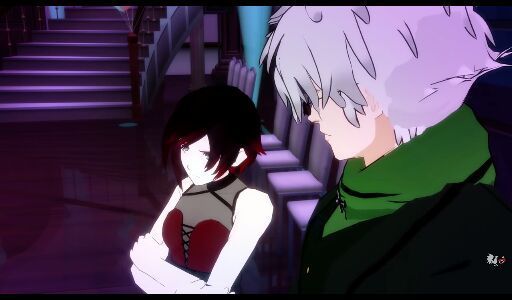
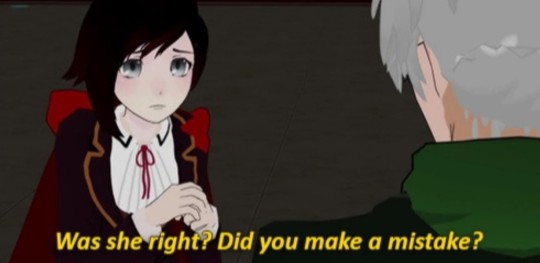
Ruby is incredibly small compared to Ozpin. He towers above her and she’s constantly in a position of looking up to him, mirroring the ways in which she figuratively looks up to him for advice. Her mannerisms are also younger and don’t carry much confidence. Crossing her arms and sulking. Wringing her hands while asking if she’s made a mistake. The way Ruby moves contrasts Ozpin’s own very still, very composed mannerisms. Body language and facial expression is one of the primary ways that we communicate and the slightest change can carry a world of meaning. For example, compare these two shots of Yang from Volume 1 and Volume 6:
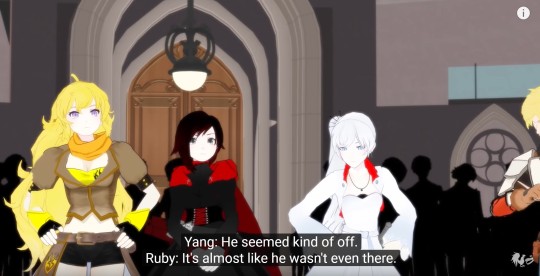
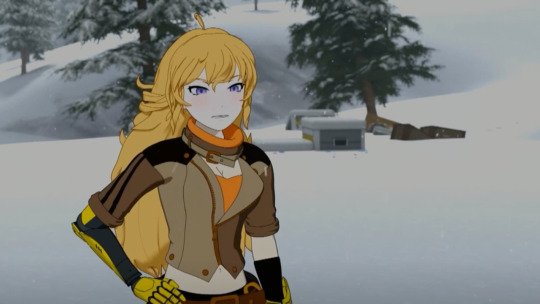
On the surface they appear quite similar, but provided there isn’t something impacting how we read these moments (such as some people with autism), we learn that these poses mean two very different things. Two hands on your waist is a relaxed pose; one hand on your waist is an arrogant pose. At least when combined with an angry expression. One arm, the placement of her eyebrows, and suddenly Yang’s attitude towards Ozpin has radically changed. We went from casual respect to defiance, and most viewers wouldn’t need to know anything else about RWBY’s story to read that here. Her body language alone tells the story.
Ozpin’s body language with Ruby then cues the viewer into the fact that he (supposedly) has the answers here, simply by virtue of him exuding a confidence that Ruby doesn’t possess yet. Who do you look to in a bad situation? The person screaming and running around in panic? Or the person who calmly announces that they can help, getting everyone else to calm down by keeping calm themselves? This sort of characterization is partly why the fandom grew suspicious of Ozpin early on. It’s not simply that he (on the surface) is modeled after the shady authority figure trope, but that we’ve learned from real life experience that a person’s ability to keep calm and speak eloquently doesn’t necessarily mean that they’re right. Sounding authoritative is a skill and it’s why the likes of cult leaders and dictators are so dangerous. If you just sound and look like you know what you’re doing, people have a tendency to believe you. And if you’re inclined towards critical thinking, you might be wary of the person whose demeanor is a little too polished.

Even when Ozpin is being playful he maintains a certain level of dignity. His clothes, his physical looks, and the controlled movement of the mug—he’s not jumping around like Nora might—all remind us that Ozpin is the headmaster here and thus, though he’s making silly jokes about popcorn right now, he deserves a certain amount of respect. Even his posture speaks volumes, one arm still tucked behind his back and shoulders ramrod straight. It’s a posture that speaks of training and discipline. There’s a reason that the general (Ironwood) is always animated as standing tall with hands neatly folded and the presumably less dependable drunk (Qrow) is animated with a constantly hunched posture. How Ozpin stands is a quick and easy way to tell the viewer, “This guy is in charge. He’s powerful. He’s wise. You can rely on him.”
All of this changes dramatically once Ozpin is thrown into Oscar’s body. Moving chronologically, it’s significant that the group is not introduced to this new Ozpin as a dignified individual.
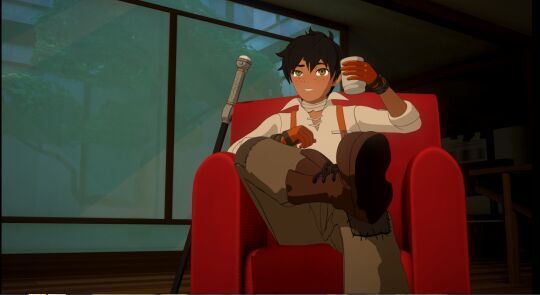
This is what we get later. Note the crossed legs, still good posture, even the ‘adult’ way he holds a mug. In contrast, someone younger and more childish in terms of their personality, like Ruby, tends to hold a drink with two hands and chucks it all back in a manner that would never fly at a dinner party.
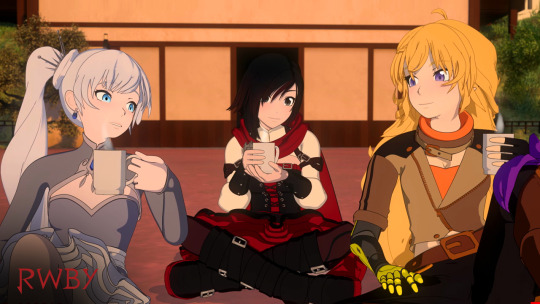
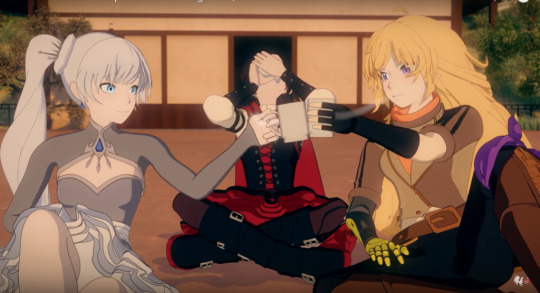
Rather than a dignified Ozpin knocking at the door, the group first encounters Oscar, someone who, like Volume 1 Ruby, can be incredibly timid and lacks in self-confidence. This isn’t the body language of a leader arriving to provide you with all the answers.
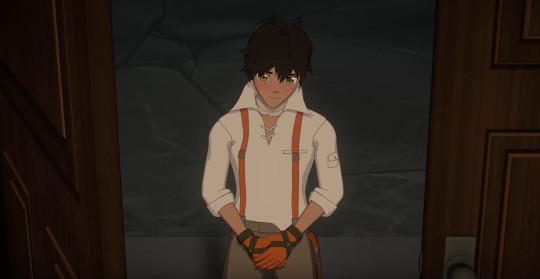
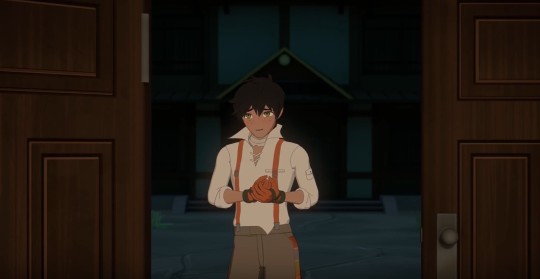
Oscar’s slouched posture, downward gaze, wringing hands, and fearful expression all paint him as the weak one here. Made worse by the fact that he asks to see Ruby and ignites (an entirely understandable) suspicion in the group. Their first interaction is characterized by perceiving him as both a potential threat, but also one they can easily handle. We don’t like that he’s asking about Ruby, but we can take him in a fight no problem.
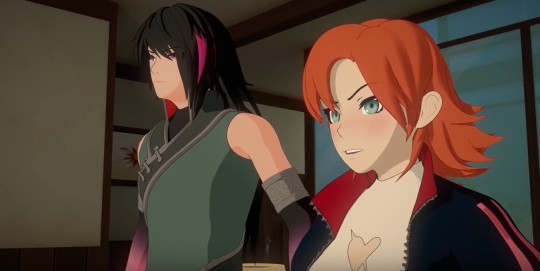
And yes, this first impression makes a difference. Knowing something about someone on an intellectual level usually doesn’t trump the emotional response we have to the physical markers we’re faced with. As a non-RWBY example, let’s say you were introduced to these two characters.
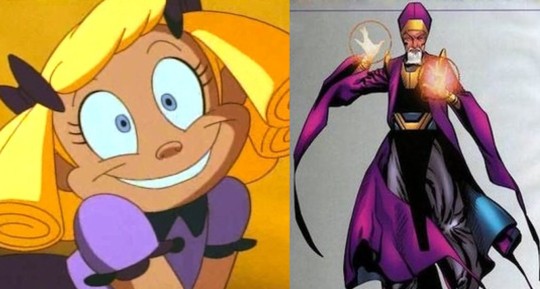
Ignoring for a moment that we’re comparing a villain and a hero, let’s say for the sake of argument that you’re told—and are provided proof—that each of these characters are morally sound, powerful adults and you should afford them with the respect they deserve. Being told that simply can’t outweigh what we see. Who are you more likely to respect? The woman who looks like a literal child named Baby Doll in a cutesy outfit, or the very old looking man in badass robes, literally named the Ancient One? All the, “But I am an adult” in the world isn’t going to convince people to read, and therefore respond to, Baby Doll in the same way they would the Ancient One.
That’s the situation Ozpin is in now. He’s told the group that he’s Ozpin, he’s managed to prove it, but there’s always going to be a part of Ruby and the gang that doesn’t quite believe it. Not in Jaune’s literal sense of, ‘He could be lying about who he is,’ but just in a more instinctual, ‘He says he’s our headmaster, but all I see is a fourteen year old kid.’ What you see makes it really easy to ignore what you know, particularly when those two things contrast. Those markers Oscar brings to this new version of Ozpin are simply too influential and yes, that opens the door for the group to treat him with far less respect than they would in his adult form. We see it right from the start when, despite having been told that this is also Ozpin, the group coos over him in an overbearing, disrespectful manner.
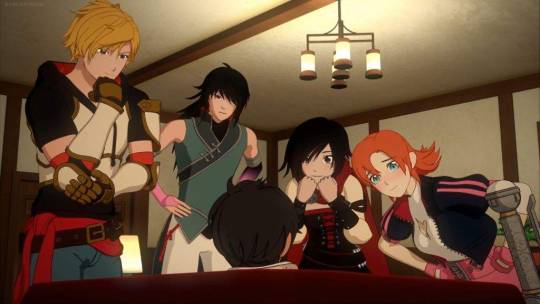
This continues even after Ozpin has taken control and is doing everything he can (those dignity markers) to regain some level of trust and respect. Even while seated and attempting to command the room as Headmaster Ozpin, Nora nevertheless undermines that with “Cute little boy Ozpin!” She has chosen to emphasize his looks over his status and notably no one listens when he says, “Please don’t call me that.”
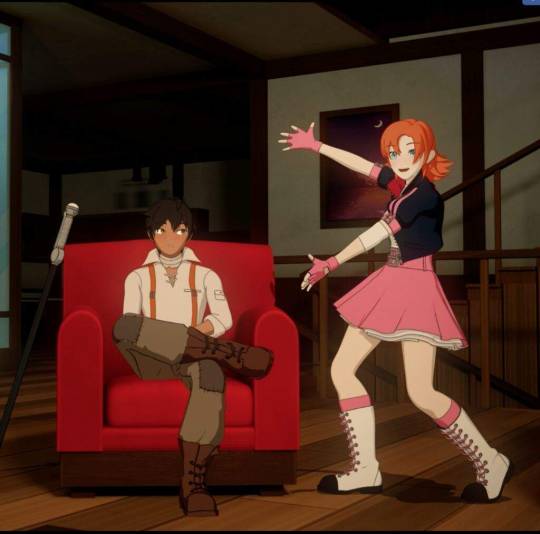
Ozpin has, in this moment, literally been labeled as a child. A “boy.” Though we can’t be sure about what age all his hosts were when Ozpin arrived, based on Jinn’s vision it doesn’t look as if reincarnating into teenagers is common. This may even be the first time.
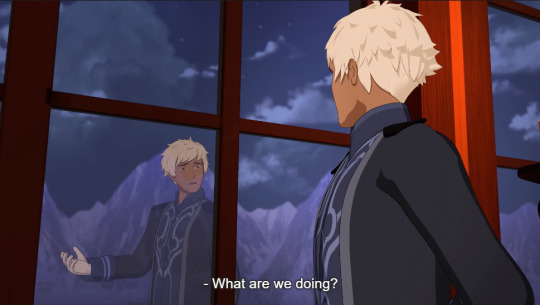
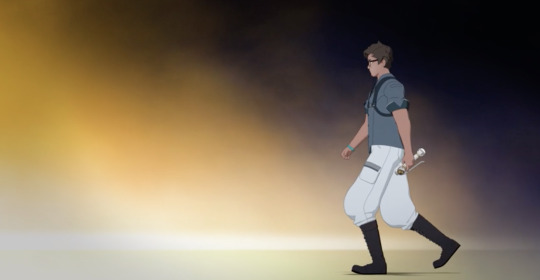
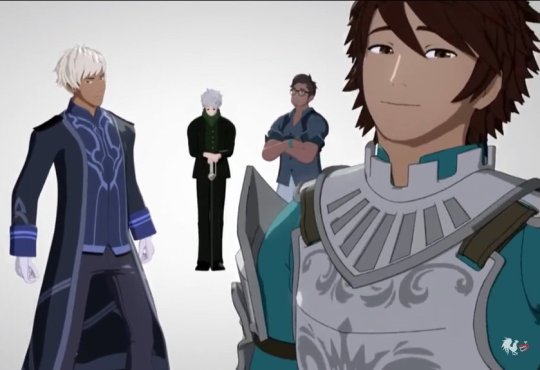
Any of these past reincarnations would have been able to command more authority, simply because they’re adult men not dressed in dirty farm clothes. If this Ozpin had shown up in Haven,
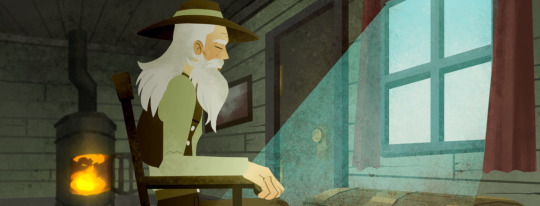
we would have gotten a very different volume. Age matters. How we perceive age matters. We saw this right in RWBY’s second episode wherein Weiss calls Ruby out on attending Beacon.
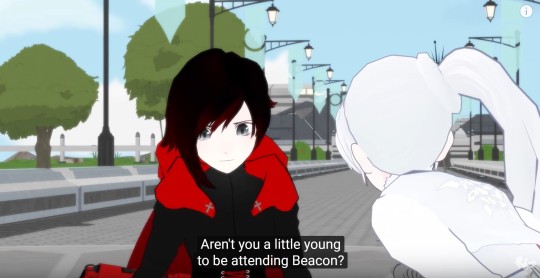
It’s Ruby’s looks and Ruby’s looks alone that encourage Weiss to come to the conclusion, ‘You shouldn’t be here.’ The same thing has now happened to Ozpin. You look younger than us and are inhabiting a body that physically couldn’t beat us in a fight? You shouldn’t be here. You definitely shouldn’t be giving us orders.
The group had control of Ozpin’s safe house. They were poised to interrogate him for showing up at it unannounced. Now they emphasize Oscar’s age and characteristics over his, which is ironically the only time that they emphasize Oscar’s individuality over Ozpin’s. In short, they’ve created an environment where a part of them truly believes that they’re older and more knowledgeable simply because of how Ozpin now looks, even though technically they know this isn’t true. It’s a new dynamic and with that comes the confidence to treat him like the fourteen year old stranger he “is”. I don’t believe for a moment that Yang would have ignored Ozpin’s direct questions, shot out irrational accusations, and then demanded a promise from him if he still looked the way he did at Beacon. Especially as someone who came to Haven later and therefore missed the initial proof, Yang simply doesn’t read Ozpin as Ozpin. We’ve seen how other characters interact with him from a student-teacher dynamic and it’s far more respectful.
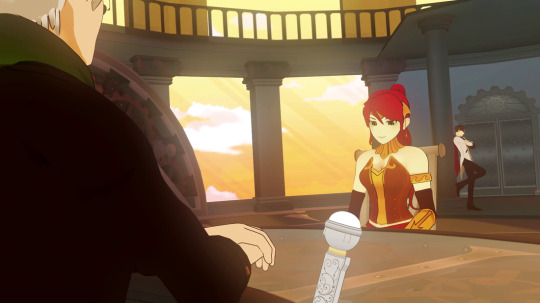
As this shot demonstrates, there’s also that issue of Ozpin’s size. Where as a headmaster Ozpin commanded authority by being taller than almost everyone else around him, Ozpin as Oscar immediately loses authority by being the smallest in the room. As I mentioned with Jaune and Cardin, size is an easy way to emphasize vulnerability. We quite literally couldn’t have gotten this scene if Ozpin was still 6'6" and looking twice Jaune’s age.
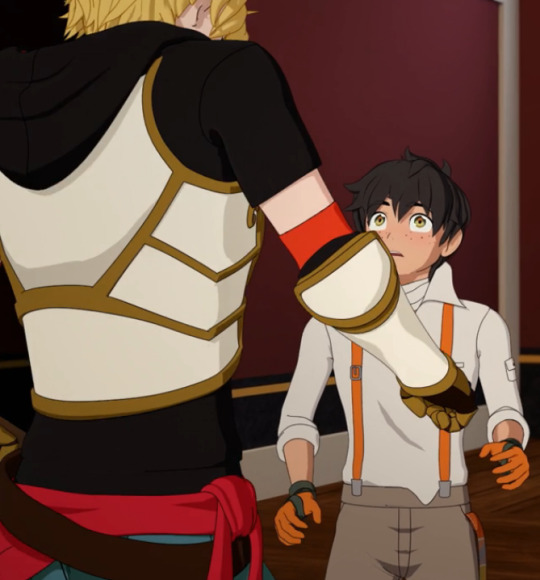
In this scene Jaune honestly thinks this might be Ozpin. He’s accusing him of lying again, of claiming to leave when really he’s spying on them, or just pretending to be this kid called ‘Oscar,’ whatever. The point is that Jaune is working under the assumption that he’s interacting with his headmaster, yet that knowledge obviously doesn’t give him pause. Because Ozpin’s new look outweighs everything else Jaune knows about him. He’s angry and now suddenly Ozpin isn’t an intimidating huntsmen capable of defending himself, Ozpin is a teeny-tiny kid with no training. Jaune becomes Cardin through the realization of, “Oh. If I’m bigger and more powerful than this person, I can do whatever I want to them.”

Ozpin’s size is an ongoing reminder that, despite possessing his own skill as well as magic, he’s in a vulnerable position. He needs to stand on the furniture in order to recreate his students literally and figuratively looking up to him, but now it just reads as a joke.
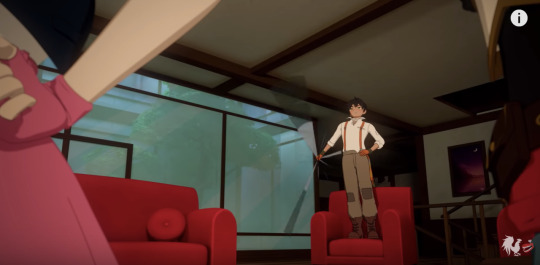
This isn’t the first time RWBY has used size this way. Cordovin is an excellent example of how a small, non-dignified looking person is unable to maintain authority in the way someone with another appearance might. Her white hair just makes her look old rather than wise and her short stature is so extreme that it invites humor. It’s not just that Cordovin is a racist, or that her guards act like Tweedledum and Tweedledee. Her appearance immediately gave the group another excuse for why they shouldn’t listen to her. Look at this tiny old woman trying to tell us what to do. Yeah right, lady. We could probably punt you into the sun so step aside.
This is a look that makes guards release prisoners in three seconds flat.
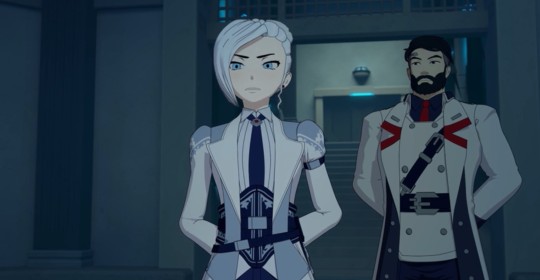
This is a look that encourages laughter and, by extension, a lack of respect.
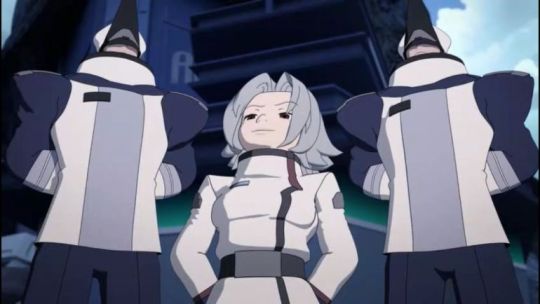
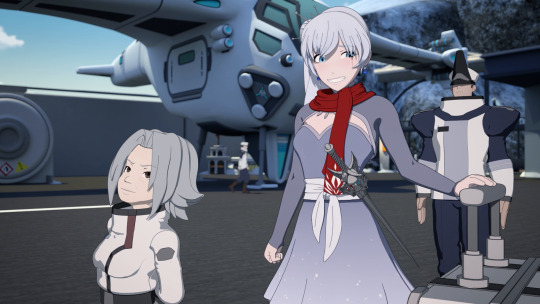
The extreme camera angle in order to make Cordovin look ‘imposing.’ The fact that she looks like a literal child next to Weiss… none of it encourages the group, or the audience, to take her seriously. Rooster Teeth made a conscious decision when they decided to animate Volume 6′s “bad guy” as an old woman with sagging breasts and an extremely small stature.
The only time when someone that small is re-characterized as authoritative is when they’re standing up against unimaginable odds.

Ignoring that this scene in reality is Ruby refusing to take responsibility for the crimes she is currently committing, what Rooster Teen wants this shot to do is function as an example of extreme heroism. That’s accomplished by taking our second smallest character and situating her in front of a larger-than-life mech. Ruby’s refusal to back down in the face of something so much bigger than her is (again) supposed to be inspiring. She’s standing up to Cordovin’s “bullying” in a way Oscar was unable to do with his own mech: a bigger and more threatening Jaune.
(I really cannot express how awful Volume Six was wow).
All of which brings me to my final point. Namely that, by virtue of his age and size, Ozpin as Oscar will always look ridiculous when attempting to make use of his former markers. Using a cane?
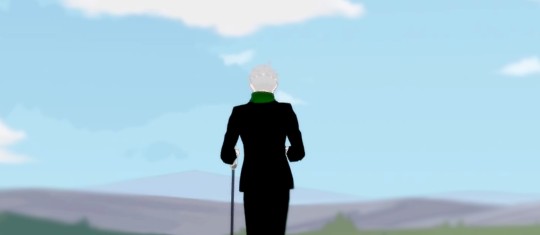
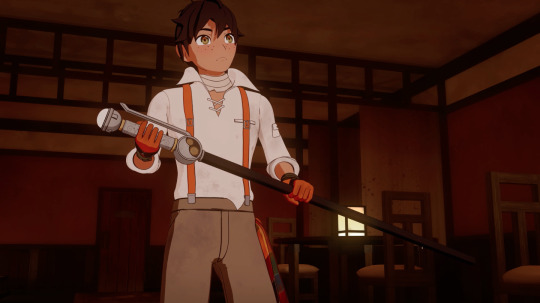
Headmaster Ozpin’s age and height makes it look distinguished. Ozpin at Oscar’s age and height makes it look silly. What’s the fourteen year old doing with a cane nearly as tall as he is? (Acknowledging that this is an ableist assumption. Some fourteen year olds do need canes, but most viewers are going to question this in a way they never would with the white-haired adult). What’s the kid doing with such a fancy looking cane when he’s literally covered in dirt, bandages, rags, and badly mended clothes? That’s a silly contrast.
Headmaster Ozpin fighting? Totally badass. One of the shortest and yet most talked about fights in the show.
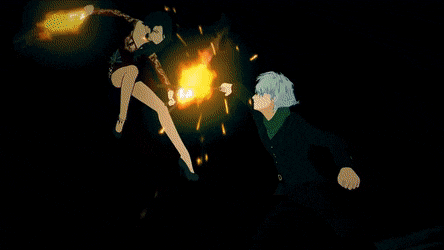
Ozpin as Oscar fighting? Still badass… if you’re willing to work for it a bit more. But really, the kid swinging a cane around just will never have the same feel as a grown man who looked like Ozpin did.
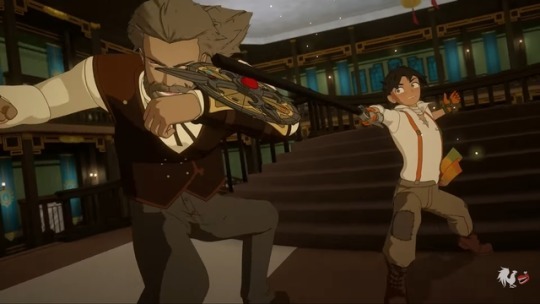
Ozpin himself is a dignified person, but anytime he adopts those mannerisms now he looks silly at best, arrogant at worst.
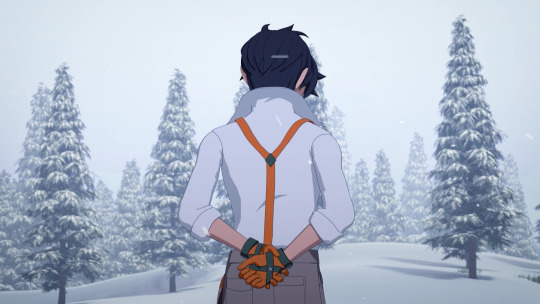
I think his look is largely why so many fans read the snow scene as him talking down to the group. He no more talked down to them here then he did when he conversed with Ruby, or Pyrrha, or the team while heading off to Mountain Glenn. The only difference is that the previous Ozpin commanded all that authority, so his warnings and criticisms held weight. This Ozpin not only doesn’t look the part of an authority figure, half his time is spent being Oscar, someone who defers to and scurries around the rest of the group. So when Ozpin tries to take charge here, everyone is far less willing to listen. People are inclined to read him as arrogant, patronizing, talking down to others, etc. because it looks like a small child giving orders to a more older, more powerful team. Even though it’s not.
It’s the combination of everything above that leads to moments like this. Where Ozpin is smaller, more vulnerable, looks too young, too naive, where the group towers over him for once and hurts him both physically and emotionally because now they can.
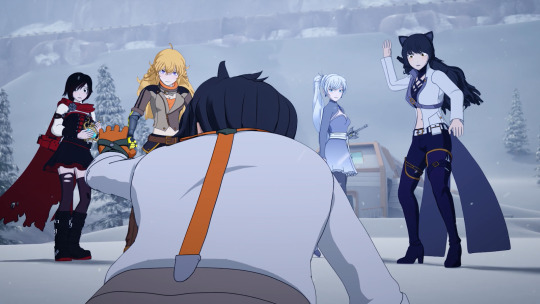
Tl;dr: Yeah. Oscar’s looks and Oscar’s personality changed things irrevocably. If Ozpin had still looked like Ozpin the group wouldn’t feel half as entitled to this behavior and gaining their respect—from ‘Please don’t address me like that’ to ‘Please understand why I kept secrets’—would be far, far easier.
128 notes
·
View notes
Photo
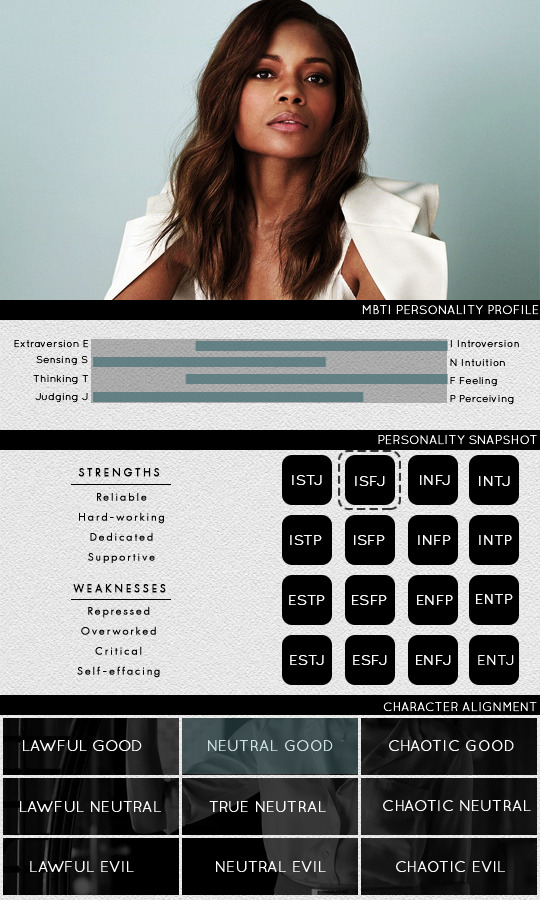
MBTI - ISFJ Moral Alignment - Neutral Good Enneagram - Type 2 Temperament - Melancholic TV Tropes - Black Boss Lady; Girl Friday; Love Hurts; Secret Relationship; Undying Loyalty
(details below the cut)
MBTI | ISFJ - The Defender or The Nurturer (x & x)
Defender personalities are a wonderful group, rarely sitting idle while a worthy cause remains unfinished. Defenders’ ability to connect with others on an intimate level is unrivaled among Introverts, and the joy they experience in using those connections to maintain a supportive, happy family is a gift for everyone involved. They may never be truly comfortable in the spotlight, and may feel guilty taking due credit for team efforts, but if they can ensure that their efforts are recognized, Defenders are likely to feel a level of satisfaction in what they do that many other personality types can only dream of.
---
The ISFJ is warm, generous, and dependable. They have many special gifts to offer, in their sensitivity to others, and their strong ability to keep things running smoothly. They need to remember to not be overly critical of themselves, and to give themselves some of the warmth and love which they freely dispense to others.
Moral Alignment | Neutral Good (x)
A neutral good character does the best that a good person can do. He is devoted to helping others. He works with kings and magistrates but does not feel beholden to them.
---
These characters value life and freedom above all else, and despise those who would deprive others of them. Neutral good characters sometimes find themselves forced to work beyond the law, yet for the law, and the greater good of the people. They are not vicious or vindictive, but are people driven to right injustice. Neutral good characters always attempt to work within the law whenever possible, however.
Enneagram | Type 2 - The Helper (x)
Twos are empathetic, sincere, and warm-hearted. They are friendly, generous, and self-sacrificing, but can also be sentimental, flattering, and people-pleasing. They are well-meaning and driven to be close to others, but can slip into doing things for others in order to be needed. They typically have problems with possessiveness and with acknowledging their own needs.
Temperament | Melancholic (x)
They hold themselves and others to unrealistically high standards, and get distressed when these standards are not met. This leads to them being self-deprecating - because they do not meet their own standards...
---
They are very stubborn, because they try very hard to stick to their own carefully considered views and standards of perfection, and are not easily shifted from this path. They do not go with the flow.
They are tenacious and cannot let things go, because 'good enough' is not good enough.
TV Tropes
Black Boss Lady - The Black Boss Lady is characterized by being a Twofer Token Minority, both a woman and Black, in charge of probably mostly men in a stereotypically male profession. Right there, you know she's a badass because she must be so good at her job, that even any discrimination which might have been in her way due to either her gender or race was bulldozed flat in two-point-five seconds by her incredible competence.Because the Black Boss Lady is good, or she wouldn't be where she is today. She's not afraid to take some risk if there is a decent chance of a worthwhile pay off. She presides over her organization with an iron fist, but she's also a Reasonable Authority Figure....
Girl Friday - The faithful female servant. She's not an Action Girl on the surface, but neither is she a Damsel in Distress; her main job is to help out The Hero (usually her boss) at critical junctures. Sometimes she provides critical information, other times it's just a helping hand or heart, sometimes with a side of Unresolved Sexual Tension. Don't presume the Girl Friday can't fight, however — she can still kick plenty of ass, sometimes turning into a full-fledged Battle Butler.
Love Hurts - Forget life-threatening superheroism, acting Too Dumb to Live, and Tempting Fate. The dumbest, most insane and dangerous thing any hero can do in any media is... falling in love. Dare to love someone else and you set up yourself and your beloved for a plethora of emotional griefs.... About to commit permanently? Look for an Anyone Can Die to put a permanent end to the Will They or Won't They? issue. Forget to say goodbye to your beloved that one time? It'll haunt you for the rest of your life.
Secret Relationship - Two characters suddenly wind up in a relationship together and decide to keep it a secret from everyone. The reason can be perfectly solid, e.g. one of them is the other's boss...
Undying Loyalty - When given to a Sidekick, expect it to be an unselfish willingness to support the main character. It can also be given to friends who, despite their differences, are genuinely fond of the other, and bonus points if it works both ways.Should the object of this loyalty die, expect generous helpings of Due to the Dead as the loyal one works to honor the fallen one's memory.
4 notes
·
View notes
Text
The Regional Differences of Nier (And Why the Western Version is Better)
Nier (2010) is one of countless games to change based on the region its released in. While the localization process is nothing interesting in the realm of video games, the extent to which Nier changes is quite immense. The significant difference between Nier Replicant, the Japanese Playstation 3 version, and Nier Gestalt, the Japanese Xbox and worldwide version, is the age of the main character (canonically and for the sake of this essay titular) and his relationship to Yonah. In the former, Nier is Yonah’s older brother, while in the latter he is Yonah’s father. There appears to be a twenty or so year difference between the two Niers, and in general this does little to affect the gameplay. Yoko Taro is on record as saying Replicant was the original premise, while Gestalt was an attempt to appeal to a wider audience, as they feared the younger protagonist would not mesh well with western players. While their fears weren’t misguided, this change has wider thematic implications that overall service the narrative better than if Nier had remained a brother.
While Gestalt is available in Japan, it’s important to note that it is the Xbox version. Japanese support was weak for the console, hence any user being hard-pressed to name several noteworthy Japanese made games that did not cater to the west in some fashion (at least overseas, because there were a surprising number of japanese only shoot-em-ups and rpgs exclusive to the Xbox). All to say, that even if this version was available in Japan, the developers didn’t make it with Japanese players in mind.
Yoko Taro is no stranger to challenging tropes in video games, and this is one of the surface reasons Nier’s age difference works between versions. Tropes vary depending on regional culture, so it is not too far-fetched to suggest a game challenging conventional game design and its tropes would change important/visible aspects of its game to challenge them. While a caring big brother is a common trope in the West, there are more instances of it in Japanese media (particularly games and other contemporary media). On the other hand, the caring father figure is a trope that, though it would not be amazingly popular in video games for another two years after Nier (thank you The Last of Us), is familiar to the average consumer. On a basic level, the big brother and father roles are functioning the same outside of a few script changes and different voice acting. Gameplay wise, brother Nier has a better excuse for not having the ability to wield greatswords and spears than father Nier, but this doesn’t amount to much beyond a jarring absence of those weapons in the first half of the western version. As the game goes on, there is a different importance placed on the character depending on their age and relationship, and the implications for the story are greater for father than they are brother.
Our expectations for these characters’ knowledge varies depending on how old they are; we would expect father Nier to be wiser, to know more about this world than we would for brother Nier. What we would chalk up to naivety for brother Nier is then considered willful ignorance if not outright manipulation for the older one. Brother Nier is a simpler character in this regard, because he’s young, and we can only despise what he does so much before realizing he didn’t know any better. Father Nier, on the other hand, is old enough that his lack of empathy provides stronger commentary for his character.
At the root of Nier (game) is the matter of perspective: what looks good for one character is disastrous and hostile for another. The game reveals this information towards the end of the first playthrough and all throughout the second. This information then informs the player’s perspective on both Nier’s behavior and what we presumed to be hostile acts. Let’s take a look at the cutscene after Emil destroys the Aerie.
Emil is overcome with grief and sorrow because of the destruction his actions have caused. He seems genuinely concerned and remorseful after having destroyed the town, realizing all the innocent people that were surely killed in the process. Despite actions having consequences throughout the whole game, none of them up until that point have had that great of a change. From this point on, this area becomes more or less useless (and for those interested in grinding out upgrade materials, a sour sight as you wait until the next play through to grind for eggs). People to talk to, quests to complete, whatever you needed in that place is completely locked away for the rest of the play through. All that remains is a huge and empty pit.
How does Nier respond to Emil? He tells Emil, “But you saved our lives,” and goes on to explain how it was a case of them or the shades, that there was no other choice to take, and ends, almost like an order, by telling Emil, “Don’t look back.” Nier does not want Emil to think about the negative consequences of his actions, a running theme present throughout the story, usually used with regards to killing shades, where no matter how innocuous their behavior might seem, Nier will posit that there is no other choice but to exterminate each and every shade they encounter. Nier tells Emil this to keep him on his side, to influence the way Emil should see his monstrous actions. Nier needs him to believe in his cause, and there’s no room to question who’ve you hurt, or whether you are wrong.
Nier’s stubbornness persists throughout the whole game, culminating in the end where, despite knowing that the Shadowlord has just a noble a cause - in fact, probably a nobler cause considering he is the original Nier and his daughter is the original Yonah - Nier refuses to sympathize or stop himself from taking what he deserves. This isn’t to say that the Nier we play as the whole game is necessarily “the bad guy,” but that our entire notion of what it means to play “the bad guy” is entirely dependent on the perspective and player agency of that character.
It is much easier to view these enemies in simple terms as we are forced to do in the first play through, before we understand Kaine’s backstory and see how shades behave when they aren’t being murdered by the replicants. These are enemies, plain and simple. Though there are side quests and moments where this comes into question, for the majority of the main plot, up until the very end, we are meant to believe that our fight is the right thing to do. However, the second playthrough complicates this situation, and it starts to become less clear whether we should keep on going. However, Nier’s own persistent despite our own knowledge is what differentiates him from most other playable protagonists. While the player is able to make choices throughout the game, it is never during the most critical scenes (despite arguably the ending (though even then the Shadowlord must always be defeated)). Nier is stubborn and committed to the purpose he has set for himself until the very end.
Again, as a brother these actions come across just as stubborn, however this stubbornness is different from father Nier. We can look at Nier’s actions more critically when we accept that he’s consciously exerting himself and manipulating others to get the result he wants.
This becomes most clear during the battle with Devola and Popola. The sisters make the game’s point clear: Everyone has their own motives and desires driving them, and conflict happens when different characters with opposing purposes meet. It really is that simple. However, after Nier kills Devola, he tells Popola to stop. Popola responds with what might be the most powerful statement in the entire game. Her line, “Do you think I have the luxury to stop?” is particularly poignant because it invites the player to consider how important her role is and whether she could call it quits even if she wanted to. But most importantly, it makes the player question why we ourselves haven’t stopped. Why have we continued to play this game and kill these characters? Even if we separate ourselves from the characters and believe we only play to get to the end, what does this say about our behaviors and why we continue to play games at all. Why don’t we just stop? Before her phase in the battle begins, she exclaims, “No one ever stops!” She’s just as assured in what she’s about to do as Nier. While this article focuses on how Nier (the character) is changed between regions, it would be foolish not to include that this line, as it’s expressed in the English dub, does not exist in the original Japanese. In Japanese, Popola just exclaims that she’s going to kill you… Besides removing many of the implications that her English exclamation has, it really limits how deeply we can think about Devola and Popola. The English version gives a better sense of thematic ideas that have been present throughout.
The credit song for ending A works to this goal as well. Though the song is interesting for the way it explains how the world of Nier (the game) relates to Drakengard by giving the events shortly following that game’s ending, there are several lines that speak to the thematic points that I argue are made clearer in the English version. The chorus of the song goes, “Hidden so deep in veils of deceit, / Imprisoned in twisting spells - / Are we the plaything of fiends, or merely the dreams / That we're telling ourselves, telling ourselves?” While Devola acknowledges the reality of everyone having motives, she neglects to note how difficult it is to discover those motives; even Nier doesn’t find out until they tell him explicitly, and up until then everyone is certain the sisters are on the side of the replicants. These lines also acknowledge the unfounded nature of everyone’s motives and purpose. Do our duties come from a manipulative figure (as we see Nier doing to Emil) or do they come from something we hope is achievable (as we see in the side quest where the boy wants to escape his family of thieves). Are either of these better than the other?
The lines directly following the first chorus, “Strive till the phantoms are broken, / Fight till the battle is done,” refer to the end goal of these motives, which is to say, not necessarily to achieve those motives at all. If phantoms are taken to be haunting visages of the past, then we continue on until we forget about them. If we set out for war, all we can do is fight until there is nothing left to fight. Fighting until the battle is done is not the same as fighting until its won. The one referenced in the lyrics only wants the fight to be done, regardless of the results. Neither of these existences are spoken of with much reverence, more so with an acceptance that this is one framework through which we view actions in our lives. Further playthroughs build our understanding of everyone’s actions, but the game’s final ending being locked behind deleting the player’s save data asks us to question what these goals are worth (or they would, if consoles didn’t have cloud-saving and backup features).
While the song lyrics and final-ending mechanic are present in the Japanese version as well, that version of the game, primarily by having Nier portrayed as a younger character, doesn’t reinforce these larger thematic ideas as well as the English version, despite arguably having better voice acting. The English version feels like it has a more concentrated focus on these interactions because of the little things changed to appeal to a western audience. While most games don’t/wouldn’t benefit from a western localization, it’s interesting to encounter a game where such a release feels like a more tightly constructed work of art.
12 notes
·
View notes
Text
Reblogging this to add more thoughts because apparently I don't know when to shut up.
It pisses me off because this book has the potential to be really good. It's a (somewhat) interesting premise that, with more description and a few tweaks, could make a half-decent book.
When someone starts creating a story - a book, a film, a tv show, whatever - the blank canvas always has the potential to be good, or even great; the marble block has the potential to capture an angel, however you want to put it. I've only been thinking critically about the media I consume fairly recently, so I get how the easily digestible tropes and witty jokes can be enjoyable. But it annoys me that the overall story has no real value beyond small feel-good moments, for lack of a better term. It's not something that I'll think about later in anything but annoyance.
Or maybe Young Royals and its quality has bled over into affecting more than just the TV shows I watch. 🙃 But seriously, that show shattered my whole world after I finished it. I started it however many months ago, and I haven't stopped thinking about it since. Every rewatch just brings more detail I hadn't noticed before, it's something you can enjoy on both a surface and deeper level.
Alright, that's about it from me for now. Once I finally finish that book, I'll probably come back to complain about it more. Like it turns out the conflict between the main characters lasted about three pages and served absolutely no plot value, because they were back to normal almost immediately. Which is just, great.
I'm so sick of booktok books. Tropes sticky-taped together to make a semi-comprehensible and mildly enjoyable at best story. 2D characters that have no real defining personalities beyond banter and witty one-liners, that have no clear motivations or goals, that are inconsistent in their actions and thoughts. A lack of description that has you rereading passages over and over in a lackluster attempt to understand wtf is going on.
I'm reviewing this book for a bookstore magazine, and that fucking thing is the inspiration behind this. I mean, it has "TikTok" on the front cover, so I was a little sceptical at first, but now I'm just pissed off. Apart from what I've already mentioned, there are severe plot holes - the entire plot of the book is centred around a journey to recover a magical item of legends. Both of the main characters are sceptical of its existence, but they decide to try and find it anyway. Personally, I think it could have been executed much better if one of the characters believed in it fully and wholeheartedly, and was dead set on his goal to get it. Then, that would have allowed leeway for some scepticism in other characters while still moving the plot ahead, and added more depth to the otherwise bland characters. It also would have tied in very well with the backstory and just made so much more sense plot-wise.
I don't know, it's just really pissing me off. I probably wouldn't be able to finish this book if it weren't for the fact I'm writing a review, but it pains me to think of the fact I'll have to write a mostly positive review - so I'll do what I'm best at, and compliment the (few) enjoyable aspects while backhandedly complimenting the rest. I'll keep it honest, but if I didn't have a word limit/positive theme I would write a scathing review of 5k words, at bare minimum. There are so many points where I have to flip a few pages back and ask myself if I missed something - not that there's much to miss.
The two main characters are both cardboard cutouts with inconsistent goals and thoughts. One of the central conflicts between them makes next to no sense. The other two side characters are yawn-inducing and essentially useless, and I often forget they're even there. The lore of the world is bleak and two-dimensional. The writing style reminds me of The Hunger Games with its short and direct sentences, but is executed so poorly that I hesitate to compare it to, you know, The Hunger Games. It works in that series with Katniss' thought process and character, but here it just makes me cringe. It gives off the effect of trying to put emphasis on sentences that really don't deserve it. I think some books can pull that writing style off really well, when paired with other sentence structures, but in this book it just comes across as lazy and, well, badly written.
Writing a book is still an impressive feat, and the author could have done much worse. So I'll still write a kind review, but I'll keep it honest and I won't be happy about it.
Anyway, just needed to get that out of my system so that I can write a mostly positive review. But I'm just sick of what is essentially the Marvel-ification of a lot of recent YA books. I've seen other posts discussing this so I'm glad I'm not alone. And either way, bad books have always existed - it's not a recent phenomenon. Good books exist, bad books exist, and unfortunately it's a lot easier to find the latter.
26 notes
·
View notes
Text
It’s not “Born Sexy Yesterday,” y’all.
I had the great fortune of catching up with the fifth season of Samurai Jack just in time for that episode, and, well, there’s a lot I could say.
But I want to just focus on one thing: what bothers me about so much media criticism---and this is coming from someone who engages in quite a bit of it---is that, in attempting to call out issues of objectification of women and sexism against women, critics often do just what they’re criticizing themselves, stripping away female characters’ agency and personalities in their commentary, painting them as little more than helpless, pitiful things.
And that’s exactly my issue with the “Born Sexy Yesterday” video---and exactly my issue with the “Born Sexy Yesterday” trope being applied to Ashi.
(Well, aside from the fact that the whole video in question is a Jonathan McIntosh video, who was a co-writer and producer for the first season of Feminist Frequency’s “Tropes vs Women in Video Games” series, which has this issue on top of a whole host of others, but that’s a discussion for another day.)
The Trope
For a sort of “textbook” definition of the trope in question, McIntosh defines the “Born Sexy Yesterday” character as so:
McIntosh: She has the mind of a naïve, yet highly-skilled child, but in the body of a mature, sexualized woman. She also serves as our hero’s love interest. “Profoundly naïve, yet unimaginably wise” captures the essence of this trope.
“Born Yesterday” is an idiom meaning “extremely naïve, inexperienced, or ignorant.” As a media trope, “Born Sexy Yesterday” has both a figurative and, in many cases, a literal meaning.
From here, McIntosh adds that the “Born Sexy Yesterday” character has “the mind of a child manifest in a mature, female body” and is “brought into the human world already fully formed.” The character is “deliberately framed in a sexualized way” and is “defined by their innocence and inexperience of worldly things---especially when it comes to sex, romance, or basic social interaction.” Notably, they are “deliberately written to be completely unaware of their own sex appeal.”
However, a “Born Sexy Yesterday” gal---despite her newness---is still “often highly skilled in something that men will respect” (often combat), which emphasizes what McIntosh stresses is the most important part of the trope: “Born Sexy Yesterday” is more of a relationship trope than anything---and it’s a male-fantasy relationship trope at that. The guy who ultimately hooks up with the “Born Sexy Yesterday” gal is just as crucial to the trope as the “Born Sexy Yesterday” gal is herself.
And the “guy” part of “Born Sexy Yesterday” is, as McIntosh describes:
McIntosh: Typically, he’s a straight, red-blooded man who has---for a variety of reasons---found himself alone or unsatisfied in love. He finds himself disenfranchised, or otherwise directionless. He either can’t find---or doesn’t want---a woman from his own world---a woman who might be his equal in matters of love and sexuality.
He does have one thing going for him, though. He knows all about living life as a normal human being.
Of course, so does every other guy on Earth, which should make him... unremarkable. Except, to a woman born yesterday. Because she’s presumably never known another man, he would seem like the smartest, most amazing guy in the entire universe.
And here’s where we start to see how the trope is constructed as a male fantasy. It’s precisely her naïvety and her innocence that allows her to see something special in him---something that other, less innocent---or more experienced---women cannot.
In other words, a “Born Sexy Yesterday” gal, as described by McIntosh, is nothing more than a wish-fulfillment sex object for loser guys who can’t get with anyone else.
In other other words, to say that a female character fits the “Born Sexy Yesterday” trope is to say that any hopes, dreams, ambitions that she might have outside of a man---and, you know, that whole personality thing---mean nothing. To say a female character fits the “Born Sexy Yesterday” trope is to say that she is nothing more than a silly, doesn’t-know-anything sex object, because that is literally what the trope describes.
And that’s why the trope doesn’t sit well with me in the first place. It seems far more interested in bringing down women and reducing them to items of male pleasure than criticizing the writing for depicting them in that way.
Ashi
But bringing this back to Ashi and Samurai Jack, the nasty nature of this trope is also why I dislike it being used to criticize Ashi. Just like every other character that might be described as a “Born Sexy Yesterday” gal, the trope reduces Ashi to nothing more than Jack’s sexy arm candy and completely glosses over and ignores her own growth, her own journey, and her own agency.
Ashi has arguably been as much of the main character of Season Five as Jack has been. The narrative has detailed her horrific childhood, her constant love for nature, her compassion even when she was trained and ordered to have none, her wonder as she sees everything that was hidden from her, her stubbornness in her ways, her turmoil as the truth becomes impossible to deny... and that’s just in the first few episodes!
From there, Ashi gets to wander the world and learn about the world on her own, gets to discover herself and who she wants to be on her own, gets to face her mother and defeat her mother on her own---and that’s just scratching the surface. Ashi has so much growth and development separate from Jack that emphasizes that she is so much more than just some pretty “prize” for him because he can’t get any other girl (which, c’mon, seriously? Jack is hugely adored in-canon, is damn good looking, loses his clothes all the time, and is sexualized up the wazoo just like Ashi is. Ain’t no way this dude would have trouble getting some if he were really looking.).
In any case, the idea of Ashi fitting the “Born Sexy Yesterday” trope so insulting because it conveniently forgets everything about her that doesn’t have to do with Jack and her “childishness” that stems from her sheltered upbringing. Despite all of Ashi’s experiences, she’s reduced to a naïve baby who can’t handle herself and doesn’t know anything. While it’s true that Ashi’s childhood leaves her highly inexperienced in the world, her story---which the narrative has so focused on and placed so much significance on---is all about gaining experience. It honestly grosses me out that everything Ashi went through and her journey to understand what was stolen from her is just completely pushed under a rug to pigeonhole her into a demeaning trope.
Think of it this way: would you consider Rapunzel from Disney’s Tangled an example of “Born Sexy Yesterday” due to her sheltered upbringing? I certainly wouldn’t! Rapunzel is so, so, so much more than Eugene’s clueless girlfriend, and her story is all about gaining experience and independence. To say that Rapunzel fits the trope would be to erase basically the entire movie---and I feel just the same about Ashi in Samurai Jack.
And in fact, the video itself actually debunks the idea of Ashi fitting the trope at all!
McIntosh: ...the problem with this trope [“Born Sexy Yesterday”] is not necessarily with the female characters themselves. If these were simply stories involving naïve, extra-terrestrial women who learned about love and humanity, then that wouldn’t be an issue. Likewise, if the male hero was also inexperienced and our two protagonists could discover love and sex together, then that would avoid most of the troubling power dynamic issues.
So, for example, Cameron from the Sarah Connor Chronicles TV show fits the trope, but her relationship with the young John Connor is framed as much more of a mutual exploration.
This season of Samurai Jack has been a story nearly just as much about Ashi---if not as much---as it is about the titular Jack. Season Five hasn’t just been some lame male-fantasy romance, because any and all "romance” has just been left to this one episode---one, out of eight, in which Ashi has always been prominently featured and her story of self-discovery has always been of utmost significance.
Equality
The idea of Ashi fitting the “Born Sexy Yesterday” trope is also insulting because of another aspect noted in the quote above: equality. While “Born Sexy Yesterday” is a trope that “fetishes the stark power imbalance between a wiser, more experienced man and a naïve, inexperienced woman” and is “the ultimate teacher/student dynamic,” Jack and Ashi’s relationship is defined by learning from each other. Jack “shows Ashi the world,” if you will, and Ashi does the same for him later, saving Jack from himself by “showing” him all the good he’s done in the world with her words. Jack fights his own personal demons, and Ashi fights hers---and they support each other through it, as equals and friends, not master/object or teacher/student.
Especially in this contested episode, Jack is never depicted as “a wiser, more experienced man” than Ashi---right from the very beginning! Jack tries to seem like he knows what he’s doing when he orders food, but he clearly doesn’t have a clue (as eating the stuff turns his head into a fish). Ashi, meanwhile---the one who is so argued to be naïve and inexperienced---is wise enough to know not to eat the seafood. She may have been sheltered and hidden away from the world, but she’s not a clueless child who doesn’t know anything.
All the sexual metaphors in the episode also point to Jack and Ashi’s equality---or at least, to the fact that Jack is not someone significantly above Ashi in terms of romantic/sexual experience. They are both high school-level awkward around each other. They both don’t know how to figure out the “device,” and they both have to fiddle and fiddle and fiddle with it until they get it right. Neither knows what they’re doing, and they have to figure that out together, just like the Cameron and John example from the Sarah Connor Chronicles.
And, to address the naked elephant in the room, Ashi has, again, wandered around the world without Jack. She knew to cover her nakedness because of social norms---why else would she have made her dress? Ashi’s confusion at Jack’s flustered reaction to her nakedness in episode 8 seems more to me as her being confused that someone like Jack would be flustered about nudity in a literal life-or-death situation. Jack is the one acting like an immature child here, not Ashi.
Finally, from a narrative standpoint, Jack and Ashi are also presented as people put in similar, equal situations. Jack was raised to fight and kill Aku. His childhood was dedicated to the task, and in the series proper, it is still his goal. While Jack wasn’t exactly sheltered per se, he didn’t get to experience the world much as an ordinary person because he was always laser-focused on this weighty, fate-of-the-world task.
In the same way, Ashi was raised to fight and kill Jack. Her entire life was dedicated to the goal. She had no chance to experience the world as an ordinary person---and much like Jack was flung into the future and had to learn how to live in a new world, Ashi has to learn to live in a new world, too. And as shown in episode 8, they’re both still getting the hang of it!
These are people who “get” each other. They were born to fight. They were tossed into a strange new world. They’ve never had the chance to be “normal” citizens. They are both naïve and trying to figure things out together.
Jack is never presented as a grand power over Ashi. She holds her own and stands up for herself. She is not Jack’s mindless, clueless arm candy. She is not “Born Sexy Yesterday.”
Of course, I am not saying that there aren’t legitimate criticisms towards the romance. I’m not saying that people shouldn’t be upset. I’m not saying that anyone has to like the direction the series took. I’m not saying that the backlash is unwarranted or undeserved.
But to criticize Season Five because of “Born Sexy Yesterday” is demeaning, insulting, and just plain wrong.
And, personally, I find it incredibly disappointing that a video essay that should, by definition, inspire critical thinking has only seemed to do the exact opposite.
#samurai jack#born sexy yesterday#ashi#the discourse#meta#ramblings#serious talk#spoilers#sj spoilers#ooh boy i'm sorry for this godawful post but#this is why i dislike so much media criticism despite doing so damn much of it myself#anyway i really do get the discontent over the romance#but to address other points that have been brought up:#i'm a little... eh? about the age thing#i mean has jack -mentally- aged in the last 50 years?#people like to disconnect the body from the mind but i think they're actually rather connected#if the body doesn't age who says the mind does?#i'm also surprised i haven't seen anyone bring up hohenheim and trisha because that's what i see it as#don't really know how i feel about it so *shrug*#but they're two consenting adults in any case#as for the murdering sisters thing#that bugs me too but ashi literally said last ep that her mother killed her sisters so#she doesn't see it that jack killed them in any case#anyway#here's some hot fresh discourse#long post#really long post...#shut up goop#seriously wtf
163 notes
·
View notes
Photo
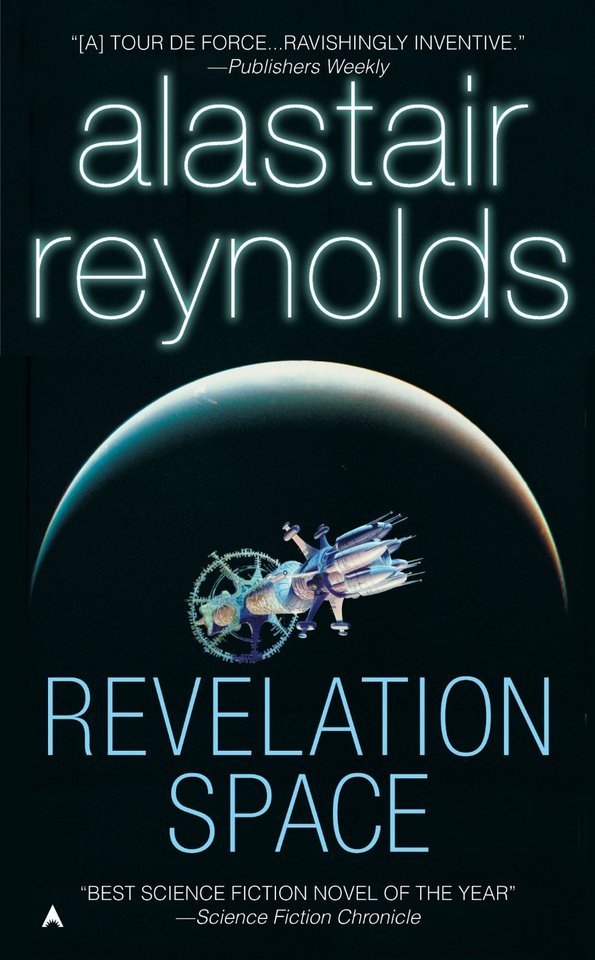
Revelation Space - Alastair Reynolds
I first posted a review of Alastair Reynolds' fearlessly ambitious Revelation Space, what was to become the first book in a trilogy, in 2002. And while I acknowledged most heartily that Reynolds "has more imagination in two brain cells than perhaps the entire populations of several small towns," I was, in the end, disappointed, giving the book two stars and labeling it "a colossal bore." Reynolds' adventure, I thought at the time, was simply crushed under the weight of his verbose, detail-obsessed prose.
But something kept nagging at me in subsequent years, in a way that I am almost never nagged after disliking a novel. No, it had nothing to do with the fact that mine was a minority opinion among critics, most of whom were tossing out "Best Science Fiction Novel of the Year" clichés as fast as their fingers could type. I try never to let either popular or critical opinion influence me if I can help it. My thinking is that going into a book as cold as possible will result in the most honest opinion.
What was nagging me was that, despite my disappointment, images and bits and pieces of the novel simply would not get out of my head. This is saying something, since, with the volume of SF and fantasy I read, I do not exactly retain an eidetic memory of everything I've read that I can call up in a second or two unless the book literally bowled me over. But in the case of Revelation Space, two and three years later I still could remember the opening scene in the archaeological dig on the lonely planet of Resurgam with remarkable clarity. The dark, eerie corridors of the vast starship Nostalgia for Infinity still brought haunting images to mind. Had I just missed something? Perhaps I had read Revelation Space at a time that I was not very receptive to epic SF. (I suspect that having since gone on to read the work of Peter F. Hamilton and Dan Simmons, SF of this monumental scale has become more appealing to me now that I've seen it done well.) Or was this all just wishful thinking, and the book truly a soporific snoozefest?
There was only one thing to do: re-read the book. And while re-evaluating something you've originally panned isn't a common practice among critics, we should be open-minded to doing so when the occasion warrants. (And it doesn't always, so don't expect a new review of The Eye of the World.) Often works of art are released before their time, like Blade Runner. Or their qualities are only evident to some audiences right away, while other audiences have to warm to the work over time.
Well, upon re-reading Revelation Space, I will say that to a large extent I maintain some of my original opinion. This is an often ponderous epic. Reynolds has so many Big Ideas to communicate to his readers that he falls into the hard SF writer's most commonplace trap: the infodump. Passages go on at g-r-e-a-t length to elucidate some aspect of Reynolds' extravagant future. But there's nothing anywhere that could be called bad writing. The complaint is more akin to that hilarious line from Amadeus: "Too many notes!" Clearly Reynolds' universe is more important to him than his characters. So not only does the cast never fully reach the point of perfect reader identification/empathy, it seems that Reynolds knows it and couldn't care less. It's the big picture that matters to him. But if, in a manner of speaking, Reynolds can't see the trees for the forest, you can't deny that it's an astonishing forest.
The story revolves around the quest to discover what led to the extinction of the Amarantin, a pre-technological race that once inhabited the bleak world of Resurgam, orbiting Delta Pavonis. Resurgam is now a human colony wracked by political upheaval. Dan Sylveste is the son of one of Resurgam's founders, the infamous leader of the Eighty, the unwitting victims of a bungled immortality experiment. Sylveste is on the cusp of a crucial discovery — an Amarantin obelisk with engravings that hint at technologies this species should never have had — when he is unseated from power in a coup. He is only released after 20 years when his former rival, Nils Girardieau, requires his help in understanding the dazzling discovery that the obelisk has led to: a buried Amarantin city, encased two kilometers beneath the surface of Resurgam in a black sphere.
Two other groups of players enter the stage. From the rather Ridley Scott-ish Chasm City, on a planet in the Epsilon Eridani system, we meet assassin-for-hire (this seems to be the job du jour of hot chicks in the far future) Ana Khouri, who is hired — well, conscripted, actually — by a mysterious wealthy dowager named the Mademoiselle to travel to Resurgam and, for reasons cloaked in obscurity, take out Sylveste. Through plot machinations that, it must be said, are a bit clunky, the Mademoiselle forces Khouri to work for her with the aid of a rather implausible twist concerning Khouri's long-lost husband. Then, Khouri infiltrates the crew of the Nostalgia for Infinity, an unimaginably massive ship ("unimaginably massive" seems to be the only level at which Reynolds will even deign to consider an idea) whose skeleton crew of cybernetically enhanced human "Ultras" are journeying to Resurgam also to find Sylveste. But they aren't looking to kill him; they believe Sylveste can help combat a mysterious viral plague attacking the ship's systems and endangering their captain, Brannigan, who's been in suspended animation at near absolute zero at little better than "brain in a jar" status. But why, Khouri wonders, is the ship looking for a gunnery officer? And where did it get all its gargantuan WMD's, some of which could probably take out whole stars?
Before the characters all come together, Reynolds shows a deft hand at building cosmic mystery while slowly weaving thematic threads together. The Nostalgia's previous gunnery officer went mad, raving to Ilia Volyova (one of the ship's triumvirate of commanders), before she was forced to kill him, about some being he calls the Sun Stealer. And Sun Stealer appears to be the name attached to the sculpture of an enigmatic winged deity, not previously known to be part of Amarantin religious traditions, found within the buried city.
Tied into all of this is an even more bizarre enigma, that of the unspeakably alien Shrouders, who maintain areas of distorted spacetime — the Revelation Space of the title — which are rumored to protect vast repositories of wildly advanced technologies. Dan Sylveste is the only human to have ventured into Revelation Space and returned alive. And what he learned there is a key mystery of the plot.
All of these riddles wrapped in mysteries inside enigmas sometimes, not surprisingly, overwhelm the narrative. It will be the patient, not easily daunted reader who will find Revelation Space most rewarding. (For one thing, we're nearly 200 pages into the book before we get anything resembling action.) The narrative is non-linear in a way that sometimes lacks clarity, popping forward then back again over gaps of decades, and there are odd hiccups in plausibility such as the one I mentioned before. Most readers who choose to tackle this book may find it's best read in small chunks. The meticulous, nearly obsessive attention to detail in this huge narrative results in a story that can be as daunting and difficult as it is compelling.
Still, you'll find a lot to like in those details, including hints at Reynolds' disparate influences. Khouri's career choice in Chasm City — she stalks clients who pay to be stalked, and it's all captured by the media — has echoes of Robert Sheckley's The 10th Victim. And there's something about that buried city (not to mention the Shrouders themselves) that's more than a little Lovecraftian.
Finally, the reason this book satisfies where similarly overwritten epics don't is that Revelation Space does have a focused storyline that Reynolds is driving towards a climax. (And what a climax!) Too many books like this commonly leave several unresolved plot threads gaily swinging in the breeze, leaving readers with the forlorn hope that all will be tied together in some distant future sequel. Revelation Space leaves plenty open for its sequel, too, but it doesn't do so in such a way that it's a letdown in its own right.
Given that this trilogy's second and third novels are even longer than Revelation Space, I don't get the impression that Reynolds' self-indulgence is a thing he's felt any particular compunction to rein in. But I have confidence he knows how to smooth his rough edges. And as writers like Simmons, Martin, and Hamilton have proved, there are ways to do Bigness well. This debut reveals a powerful imagination straining at the leash to explore the Biggest Ideas it can tackle. And as we all hopefully would agree that SF ought to be, at the best of times, a literature of Big Ideas, to criticize a novel too harshly for attempting to excel at what this genre is all about — as opposed to falling back on the same overworked tropes — seems churlish. As Reynolds' career evolves, I suspect it's more likely that, rather than make his stories more accessible to readers who've long cut their teeth on undemanding work, he'll expect readers to evolve to his level, just to keep up. That's not a bad thing, and it might even prove a revelation.
Followed in the trilogy by Redemption Ark, as well as Chasm City, a stand-alone novel set in the same future.
The Nostalgia for Infinity
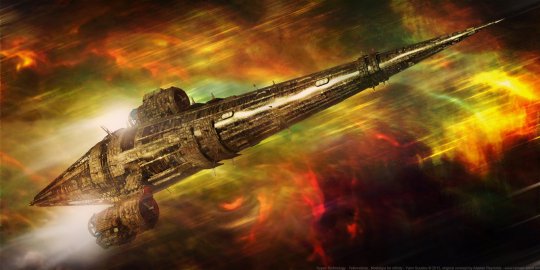
2 notes
·
View notes